Mecosta County Fair Book 2024



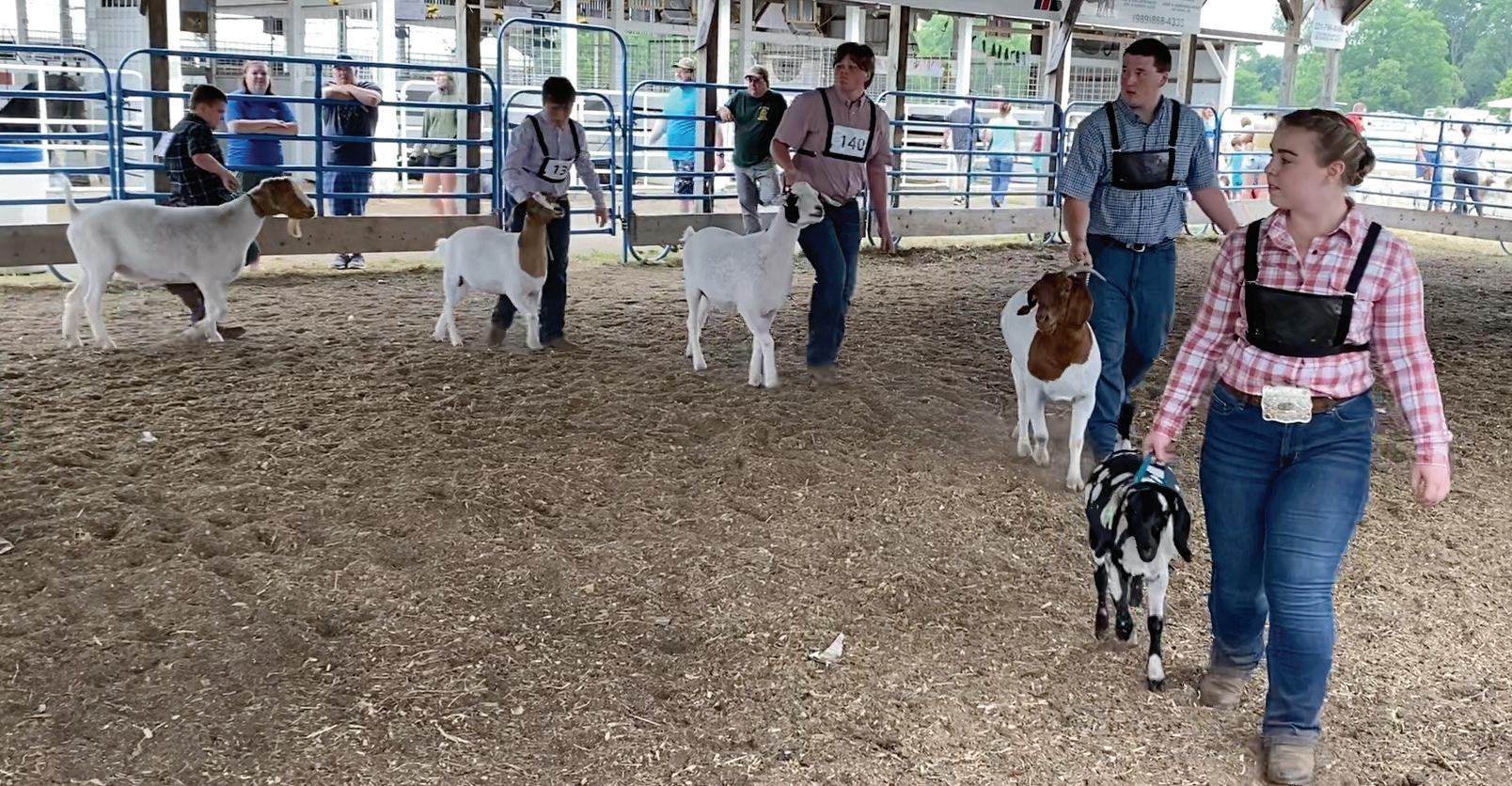







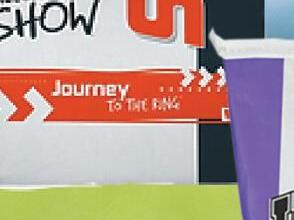











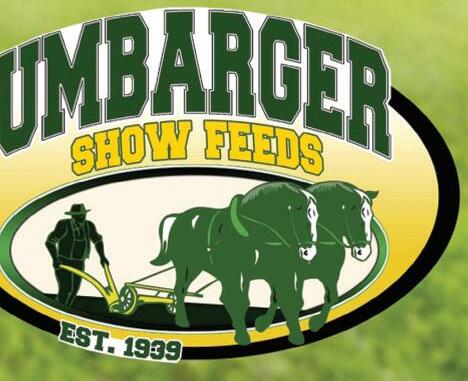





























Saturday, July 6
8:00AM to 12:00PM
Exhibit Building Check-In All Departments except 37, 46, 42, 51, (Culinary Arts & Floriculture)
Sunday, July 7
6:00AM to 11:55AM Livestock Check-In
6:00AM to 11:00AM Pig Weigh In
11:00AM to 12:00PM
Weigh in Beef Dairy Feeders Sheep Goats in order
4:00PM to 6:30PM Poultry Check In
6:30PM to 8:30PM Rabbit Weigh In
Monday, July 8
8:00AM to 10:30AM Rabbit Shows Start
11:00AM to 12:00PM
Exhibit Building Check-In Departments 37, 46, 42, 51, (Culinary Arts & Floriculture)
11:00AM to 1:00PM Poultry Shows Start
1:00PM to 3:00PM Exhibit Building Judging
6:00PM to 8:00PM Sheep Shows Start
6:30PM to 8:15PM Grand Stand - Horse Races
6:30PM to 7:30PM
Youth Exhibit Live Auction (Bake Sale)
Notes: Registration at 6:30 • Live Auction at 7:00
7:00PM to 8:00PM All Equine in place on Grounds
7:00PM to 8:00PM Equine Demonstrations Start
Tuesday, July 9
7/9 Midway Opens for the week - See Midway Schedule
9:00AM to 2:00PM Swine Shows Start
2:00PM to 4:30PM Equine - Showmanship, Trail, Versatility, Team Comp. (not cloverbud)
Notes: Classes 1-5 All Divisions, Trail Classes 46-48, Versatility 108, 109, Team Competition 110
6:00PM to 7:00PM Goat Shows Start
6:30PM to 8:15PM Horse Races & Celebrety Race
Wednesday, July 10
9:00AM to 12:00PM
Cattle Shows Start - Market Beef followed by Dairy Market Steer, Dairy Market Feeders
12:00PM to 1:00PM
Baby Calf Show /will break other Cattle Classes for this class
1:00PM to 6:00PM
Equine - Jumping, Huntseat, Saddle Seat Classes, 1/2 hour break Gymkana, Cloverleaf, Flags, Down and Back Notes: Jumping Classes 105-107, Huntseat Classes 11-25, Saddleseat Classes 28-29. Then 1/2 hour break. Followed by: Gymkhana Classes 67-78 (Cloverleaf, Flags, Down& back)
1:00PM to 2:00PM Peddal Pulls
2:00PM to 4:00PM
Dairy Breed Stock Shows Start
Thursday, July 11
9:00AM to 11:30AM Equine Roping & Obstacle Course Start
4:00PM to 5:00PM Market Sale Check In 5:00PM to 9:00PM Market Sale Begins
7:00PM to 10:00PM Rodeo
Friday, July 12
9:00AM to 4:00PM
Equine - Western Classes 30 minute break followed by Gymkhana, 1 hour break Costume Class Ages 8-19 Notes: Western Classes 30-44, Reining Class 45, 1/2 hour break, Gymkhana Classes 51-66 (Poles, Stake Race, Speed& Action, Keyhole). 1 hour break, Costume Class ages 8-19
7:00PM to 10:00PM Tractor Pull
Saturday, July 13
11:00AM to 1:00PM
Equine - Cloverbud & Pee Wee Showmanship, Cloverbud Lead Line, Walk Trot, Pee Wee Lead Line, Cloverbud Trail, Cloverbud Costume Classes
Notes: Cloverbud Showmanship, Pee Wee Showmanship, Cloverbud Leadline, Cloverbud Walk/ Trot, Pee Wee Leadline Cloverbud Trail, Cloverbud Costume
4:00PM to 5:30PM Showmanship Sweepstakes
7:00PM to 10:00PM Demo Derby
7:00PM to 9:00PM
Exhibit Items Released to owners
9:00PM to 10:00PM Horses & Non Market Departure
Sunday, July 14
6:00AM to 8:00AM Market Animals Departure
9:00AM to 11:00AM
Exhibit Items Released to owners
Saturday, July 6th through Saturday, July 13th
Fair Manager : John Currie
Fair office: 540 West Ave Big Rapids MI 49307 • Phone: (231) 629-7273
Officers: President - Steve Cramer, Vice President - Joe Wekenman, Secretary/Treasurer - Aaron Colley
Board of Directors (3 year terms):
2021/23
Chad Currie
John Currie
Pat Currie
Susan Stafford
Adam O’Brien
Joe Wekenman
2022/24
Jarred Bowman
Mike Brown, Aaron Colley
Matt Currie
Jennifer Marfio
Joe Strohkirch
2023/25
Larry Cox
Steve Cramer
Sherri Gilbert
Nick Kaye
Ken Ramsey
Todd Purcell
Honorary Directors: Frank Wheatlake & Dick Meyers
EXHIBIT BUILDING: Terry Aldrich
OVERALL LIVESTOCK: Jarred Bowman
GOATS: Faith Kwiatkowski
SHEEP: Faith Kwiatkowski
CATTLE: John Ball / Darla Zimmerman
HORSES: Tiffany Spedowski
POULTRY: MaryJo VanOstenberg
RABBITS/CAVIES: Julie Strohkirch
SWINE: Lauren Marfio / Stacey Hough
FAIR OFFICE - Betsy Cope • mcfreefair@gmail.com
FAIR MANAGER - John Currie • (231) 629-7273 • curriejohn3636@yahoo.com • 13765 14 Mile Rd., Rodney, MI 49342
SPACE MANAGER - Todd Purcell • (231) 629-5167 • sitemgtmcfreefair@gmail.com • www.mecostafreefair.com/vendors
CAMPING - Kim Young • (231) 629-0155 • kynb13@yahoo.com • www.mecostafreefair.com/camping
MICHIGAN DEPARTMENT OF AGRICULTURE & RURAL DEVELOPMENT - (517) 284-5800
MDA - Info@Michigan.gov • www.michigan.gov/mdard/lab
MSU EXTENSION - (231) 592-0792 • www.canr.msu.edu/mecosta/4-h/
Forms and Record Books: www.mecostafreefair.com/4-h • www.canr.msu.edu/mecosta/4-h/
Under the auspices and direction of the Mecosta County Agricultural Fair Association
The raising of livestock can be an educationally rewarding experience for youth. The Mecosta County Fair Board intends to develop a Youth livestock program that will provide youth participants in our county a continuing opportunity to:
1. Acquire information and an understanding of scientific livestock production andmanagement practices through the experiences of keeping records and owning and caring for livestock. To also acquire skills in executing these practices and making informed decisions.
2. Provide a business experience and an insight into values and principles of purchasing, marketing, record keeping, and securing credit which will provide an income sufficient to permit savings.
3. Encourage ethics, integrity, sportsmanship, cooperation, and an ability to speak in public through participation in related activities, such as demonstrations, talks, judging events, tours, and exhibits.
4. Learn and employ efficient procedures and methods in marketing livestock and their products.
5. Develop a clear understanding and appreciation of the livestock-meat industry and its role in the agricultural and commercial economy of the country.
6. Explore the livestock industry or a livestock-related field as a career.
7. Learn how to judge and select livestock.
8. Develop leadership skills, cooperation, self-reliance, and sportsmanship activities.
Michigan Department of Agriculture Food Inspection - Division Regulation No. 514 as Amended
Under the authority of the provisions of Act. No. 344, Public Acts of 1917, the following rules and regulations governing the cooking, dispensing, and sale of foods and beverages offered for sale at or tributary to Fairgrounds, circus grounds, carnivals, parks, resorts, and roadside stands within the State of Michigan are hereby established.
1. All stands where food is served to the public shall be constructed of substantial materials and provided with a durable roof. All concessions serving food or drink must have all cooking, processing, or preparation areas adequately covered to protect food from dust, dirt, insects, rodents, and other contamination. All such concessions must be provided with hot water for washing dishes and other utensils. Equipment used in cooking “hot dogs,” “hamburgers,” steaks, or other foods or the preparation of other foods such as candy and can-
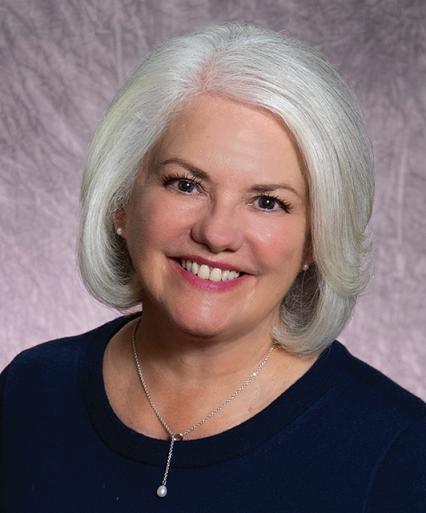

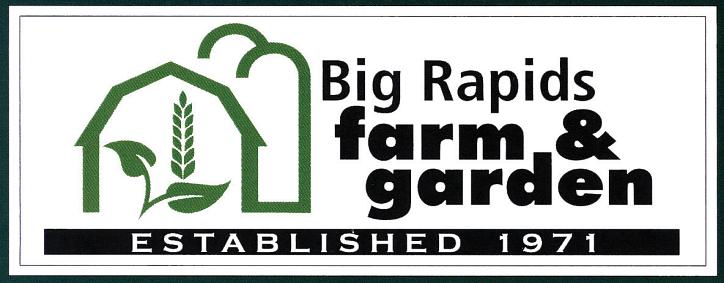




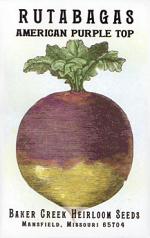
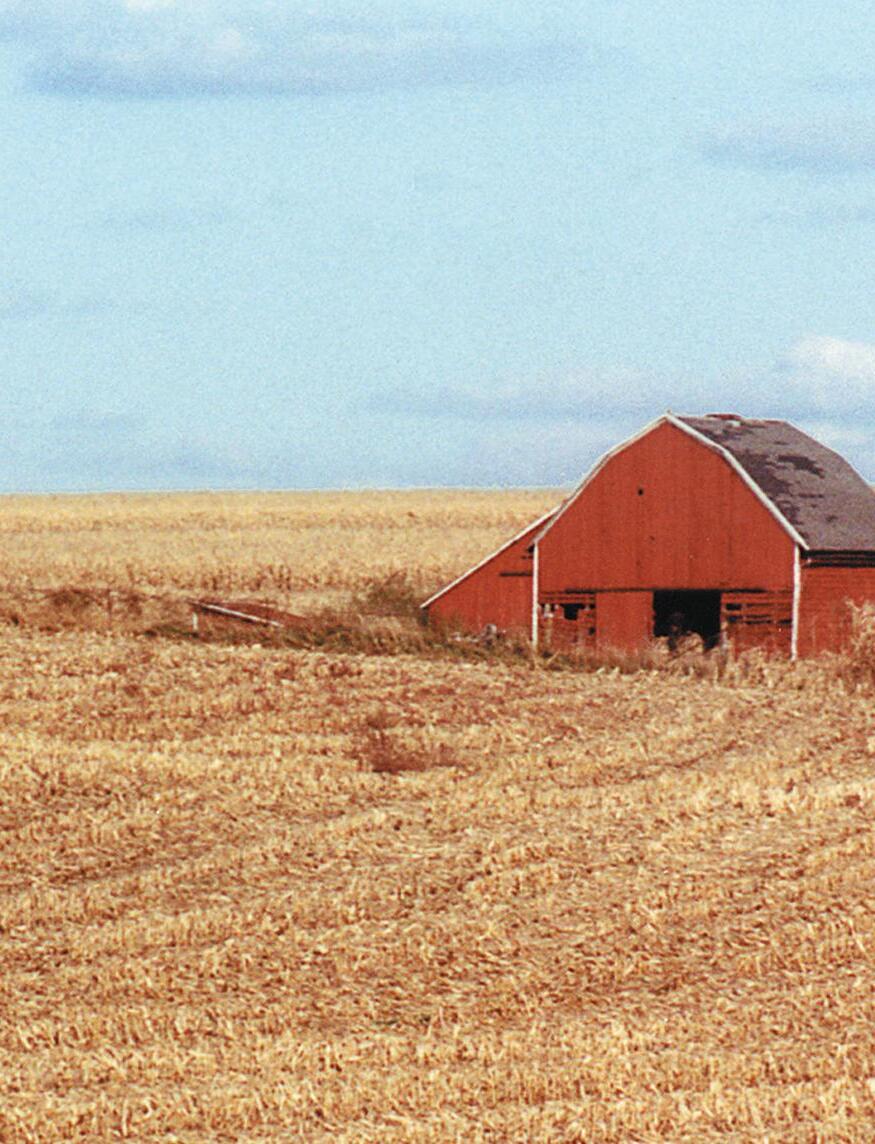








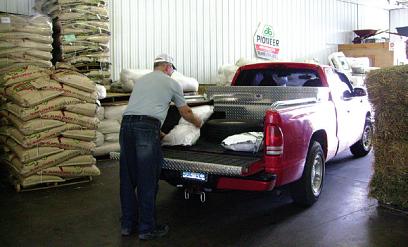







dy-coated apples, must be enclosed on at least three sides with covers extending entirely over such equipment.
2. All foods must be covered and protected from dust, dirt, and insects. Soda straws must be individually wrapped, and sugar bowls and condiment containers must be adequately covered. This regulation shall not apply when using individually wrapped or packaged portions of such times.
3. Cooking of foods in the open will not be permitted. No food or drink concession may be operated within 50 feet of a stable, refuse pile, or outside toilet not connected to a sewer or septic tank.
4. All other drinks except tea and coffee must be served in individual sanitary cups or closed individual containers. A new cup must be used for each person served. Such beverages must be drawn or served from bottles or closed containers. No dipping of such products will be permitted.
5. All water and ice must be from a tested and approved supply source. All mills and juice presses shall, while in operation, be covered and

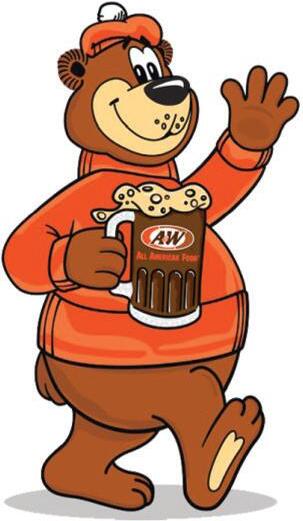


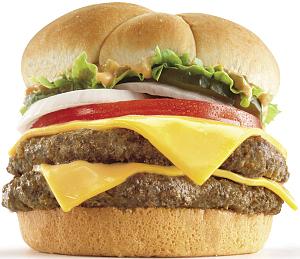




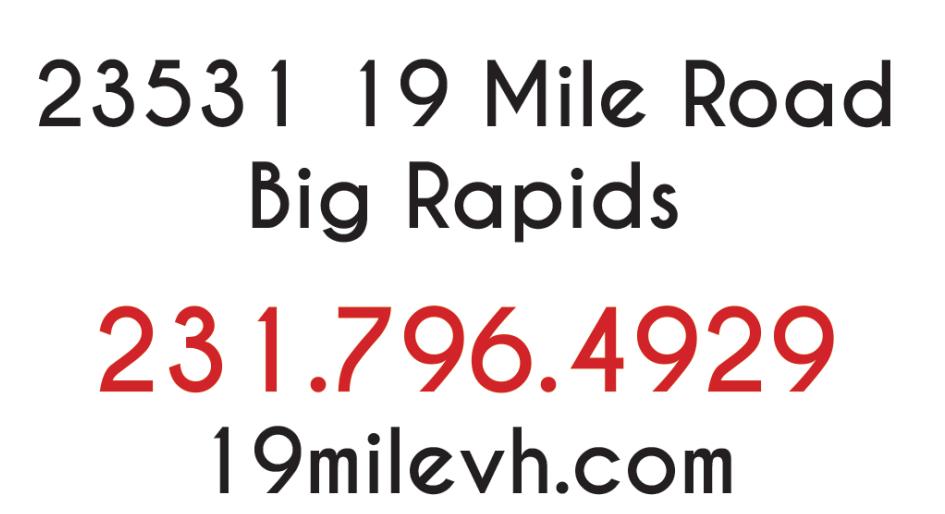
We treat all your pet’s needs including:
• Dental Care • Diagnostic Ser vices
• Emergency Care • Microchipping
• Soft Tissue Surger y • Pharmacy
• Preventative Care
From dogs to ducks, we have you covered. Call or e-mail to see if we can treat your Best Friend today!

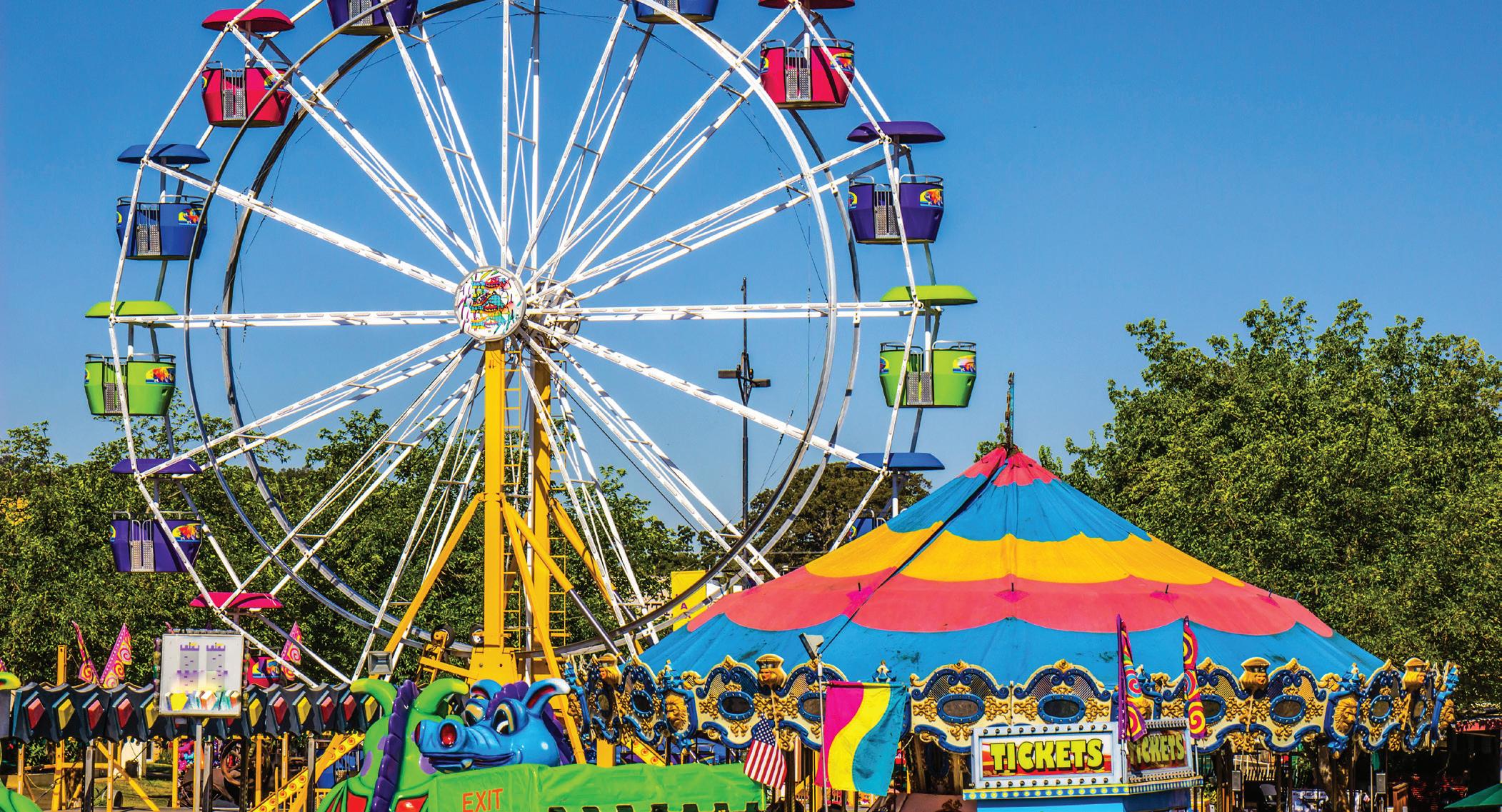


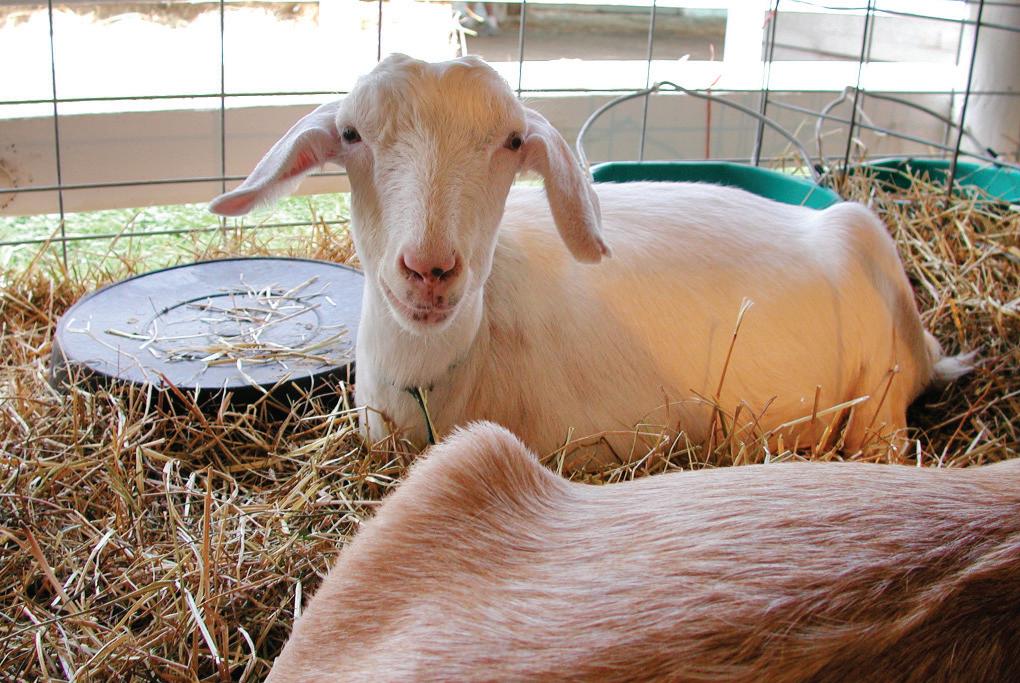

protected from dust, dirt, rodents, insects, or other such contamination.
6. All forms of ice used as part of any food or drink in its preparation must be cleaned and free from any foreign material or contamination; supplies of such ice must arrive at any fairgrounds, carnival or circus grounds, park, resorts, or roadside stands in clean, closed bags, package, or containers as prepared at the point of manufacture.
7. No cold beverages other than orange juice and lemonade shall be made on any fairgrounds, carnivals, parks, resorts, or roadside stands unless made from syrup that has been registered with the Michigan Department of Agriculture. (Sec.3, Act. 126, P.A. 1927).
8. All garbage must be covered in fly-tight, durable containers and removed daily.
9. All such drinks and any other nonalcoholic beverages that contain “artificial flavor” of any character shall be labeled “imitation,” whenever applicable, shall proceed and be in similar size type with the imitated fruit juice following. All display signs must conform to the requirements mentioned above. (Section 9, Act. 126, PO. 1927).
10. All concessions dispensing food or drinks must be equipped with available hand washing facilities on the immediate premise; individual towels and plenty of soap shall be provided.
11. Adequate refrigeration for perishable foods must be maintained and readily available.
12. All cooked, partially cooked, baked, or fried foods must be kept hot (at least 130 degrees F.) or cold (50 degrees F. or less) and may not be displayed openly unless such requirements are maintained, except those products which do not, under good commercial practices, require refrigeration or heating to safeguard their quality.
13. All prepared foods and drinks must be packaged, wrapped, or wholly protected from contamination when offered for sale, delivered to, or sold within the lot or grounds at a location other than where prepared.
14. The provisions of this regulation requiring the covering and enclosure of cooking areas shall not apply to open-pit barbecues when the Department of Agriculture approves such installations—Michigan Department of Agriculture Food Inspection Division Regulation No. 514 as Amended.
ARTICLE I This organization shall be known as the Mecosta County Agricultural Fair Association.
ARTICLE II The purpose of this Association shall be to operate a Fair at the Fair Grounds, located in Big Rapids, Michigan, strictly non-profit.
ARTICLE III The object of the Association shall be the advancement and encouragement of agriculture, horticulture and mechanical arts, household arts, and sciences; to promote Youth Club work and the FFA activities and all other types of educational work.
ARTICLE IV It shall be the object of this Association to furnish a clean type of entertainment, recreation, and amusement in connection with the Fair.
ARTICLE V (REVISED 10/17/92) The governing body of this Association shall consist of a Board of eighteen (18) Directors, six (6) of whom shall be elected each year at the Annual Meeting for a period of three (3) years. The number of Directors may be changed at any Annual Meeting. All Extension Agents, Agricultural teachers, and the Fair Manager shall be ex-official members of the Fair Board.
ARTICLE VI The officers of the Association shall consist of a President, Vice President, and Secretary-Treasurer. They shall be elected annually from the Board of Directors by said Board at the first meeting following the Annual Meeting.
ARTICLE VII The Annual Meeting shall be held on the third Thursday of October each year to elect Directors and transact any other business before the Association. Notice of the Annual Meeting shall be given in the newspaper and the local radio station. The fiscal year shall close on September 30th. Volunteer Directors shall not be personally liable to the Corporation or its shareholders or members for monetary damages for a breach of the Director’s fiduciary duties, and the Corporation assumes all liability to any person other than the Corporation, its shareholders, or its members for all acts or omissions of Volunteer Directors. A Volunteer Director is defined by Sec. 110(2) of the Michigan Non-Profit Corporation Act of PA 1987.
ARTICLE VIII - (REVISED 10/17/12) The President, Vice President, and Secretary-Treasurer shall constitute the ExecutiveCommitteee and transact such business as authorized by the Board of Directors at any regular meeting. The Manager is authorized to spend up to $3,000.00 without further authorization and up to $5,000.00 with permission of the entire Executive Board. Expenditures of over $5,000.00 shall have the approval of the whole Board.
ARTICLE IX Five (5) members of the Board of Directors present at any meeting shall con-
stitute a quorum for the transacting of business.
ARTICLE X When a vacancy occurs in any office, the Board of Directors shall fill it at their next regular meeting.
ARTICLE XI The president shall preside at all meetings and appoint the various committees and may assign multiple duties to the members of the Board of Directors, as necessary.
ARTICLE XII The Vice President shall preside at all meetings and perform all the duties assigned to the President in the absence of the President.
ARTICLE XIII It shall be the duty of the Secretary-Treasurer in conjunction with the Fair Manager to keep a record of all transactions of the Association; to receive all monies from all sources; to take care of correspondence that may come to the Fair Association, to draw orders for the payment of all bills incurred by said Association and to prepare an annual report that shall be presented at the time of the Annual Meeting.
ARTICLE XIV The Board of Directors shall provide suitable accommodations for each Fair and prepare the rules and regulations to be observed in conducting such.
ARTICLE XV An affirmative vote of two-thirds of the Board of Directors present for malfeasance in office may declare a vacancy. Any Board member who misses three (3) consecutive meetings without just cause will be dropped from the Board of Directors and replaced by a new member. Such Board Members will be replaced by submitting names to the Nominating Committee before being elected at any regular meeting.
ARTICLE XVI The Board of Directors shall grant retiring Presidents and Directors with 20 years or more service. Said membership entitles a person to annual season passes for self and spouse and children under 21 years of age.
ARTICLE XVII A membership in this organization, with the annual payment of $25.00 at least 30 days before the Annual Meeting, constitutes the right to vote for Directors at the Annual meeting. To be eligible for nomination to the Board of Directors, Anyone must be a paid member of the Association 30 days before the Annual meeting.
ARTICLE XVIII All Directors and spouses shall be provided with a season pass, which shall give them free access to any gate on the fairgrounds.
ARTICLE XIX The By-Laws may be amended at any Annual Meeting by a majority vote.
Dated March 1, 2000
RULES AND REGULATIONS REGARDING THE RENTAL AND USE OF THE HORSE BARNS AND STABLE AREA AT THE MECOSTA COUNTY FAIRGROUNDS, AS AMENDED APRIL 1992. EFFECTIVE JANUARY 1, 1987
1. Thirty dollars per month per stall CONDITIONS:
1. All rent shall be paid one month in advance. Example: January rent is due January 1st.
2. Stall rent is to be paid, and the stall Superintendent assigns the stalls.
3. The trainer is responsible for the stall rent for the horses in charge.
4. Rent not paid by the 10th of the month will result in an additional charge of five dollars per stall.
5. Any rental charges 30 days in arrears will result in immediate eviction.
6. Stall areas will be kept clean and neat.
7. Excessive drinking, profanity, or fighting will not be allowed.
8. Borrowing of equipment is not allowed without the owner’s consent.
9. No cross ties in the new barn except for shoeing.
10. Damage to stalls, stall doors, fencing, or the grounds shall be repaired at the expense of the renter responsible.
11. No stall will be rented for broodmares, colts, or other non-racing horses not in training.
12. All jogging will be done on the outside of the track.
13. No dogs are allowed on the fairgrounds.
14. Horses shall be fed and watered regularly.
15. The last person leaving the barn will turn off lights and radios.
16. Horses will be exercised or turned loose only in the designated exercise area. No horse shall ever be turned loose on the track, track infield, or any Arena.
17. The horse stalls and the grounds around the horse barns shall be kept clean and orderly. All manure and other litter must be cleaned from the buildings and entranceways and kept away from the buildings.
18. All standardbred harness horses will be required to have a Coggins test. Failure or refusal to comply with any of the above regulations shall be grounds for the immediate removal of the horse or horses from the fairgrounds at the owner’s expense.
Failure to comply with any preceding conditions will result in dismissal from the grounds and a written report of such citation to the United Trotting Association.
1. It is the exhibitor’s responsibility to know the rules and regulations for the classes and divisions they enter.
2. Youth participating in the local fair projects must be enrolled within a Mecosta County youth club recognized by the Mecosta County extension office for re-enrollment on December 1st of the previous year and new enrollment on April 1st of the current year.
3. Youth exhibitors ages are 6 to 19 years old. Age is determined as of July 1st of the current year. Anyone 20 years old and up may enter items into the Exhibit Building only.
4. The Mecosta County Agricultural Free Fair entry forms will be available online or at the Mecosta County MSU Extension Office.
5. Same-day exhibit building registrations will be accepted at the Exhibit Building at the Mecosta County Fairgrounds between 9 am and 2 pm the Saturday before the fair week.



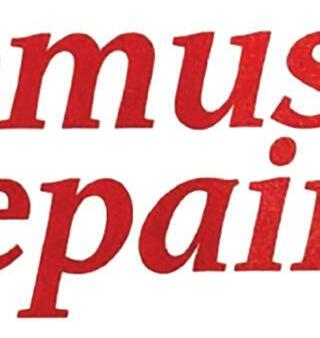













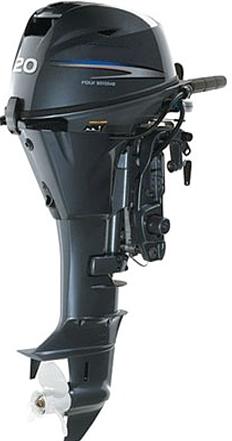


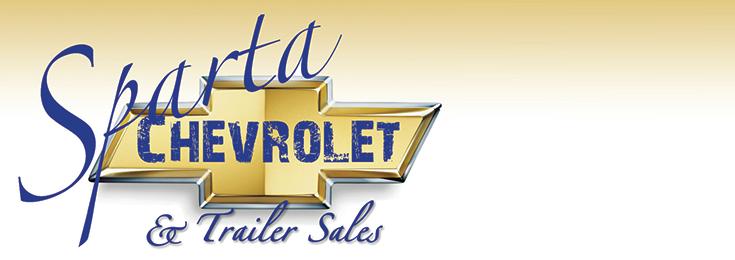



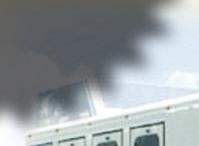

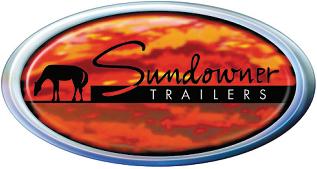
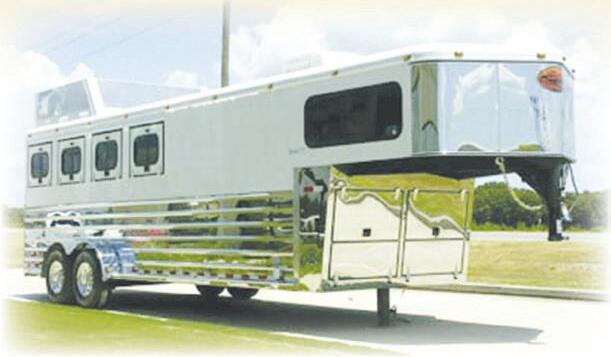
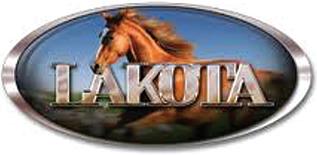

6. Exhibit tags, barn/stall cards, etc., will be available at the fair office in the Exhibit Building on exhibit placement day at the beginning of the fair week.
7. The Fair Board reserves the right to pro-rate premiums if funding is not received from the State of Michigan or its fair receipts are insufficient to pay expenses.
8. All premiums (trophies, plaques, ribbons/rosettes, premium awards, etc.) shall be forfeited if any exhibitor is involved in improper conduct in any exhibit or activity area during the fair. If deemed necessary, the person or persons will be sent home. The superintendents and the Fair Board Livestock Committee make this determination. If unresolved, it will be taken to the fair board.
9. Improper conduct includes, but is not limited to: a. Use or possession of drugs, alcohol or narcotics, vaping & tobacco b. Verbal or physical abuse c. Abuse or mistreatment of animals
10. Removal of any livestock or still exhibit before release time stated must have written approval from that department superintendent and the Youth Exhibits Agriculture Committee (YEAC). Failure to comply will result in the forfeiting of all awards placings trophies, plaques, ribbons, and premiums. Individuals and immediate family members will not be eligible to show at the Fair the following year— exceptions for early removal (death, sickness, emergency…) to be determined by YEAC.
11. Judges’ decisions are final.
12. All exhibits must be the current work of the exhibitor and can only be entered once for competition.
13. All record books and still exhibits must be removed according to the time listed in the fair schedule to receive premiums.
14. Every care will be taken to protect the article’s exhibits. Still, the Fair Association will not hold itself responsible for accidents, loss, or damage by fire, theft, or whatever the cause may be for the cause of damage or loss sustained.
15. Those camping on the fairgrounds must follow the general rules listed with their camp application, and all members of the camping party and visitors must be in their campers and quiet by midnight except for the barn watch crews.
16. NO ALCOHOLIC BEVERAGES ARE PERMITTED ON THE SHOW GROUNDS OR IN THE BARNS.
17. No smoking in or around the barns or Exhibit Building. State Fire Marshall mandates it.
18. No dogs on fairgrounds
1. The Youth Exhibits Agriculture Committee (YEAC) reserves the final and absolute right to interpret these rules and regulations and arbitrarily settle and determine all matters, questions, and differences. It further reserves the right to amend or add to these rules. It may withdraw all, or pay in part, premiums offered in all departments should an emergency exist and circumstances demand it.
2. Disregard any rule by the exhibitor or concessionaire forfeits all premiums, rights, and privileges without recourse.
3. All Livestock and Horse entries are due by the first Monday in June.
4. Youth exhibitors ages are 6 to 19 years old, allowing only one year post high school graduation.
5. Youth must be at least 6 to show a Dairy Feeder, Must be 8 to show Dairy market Steer, or Beef Steer.
6. Age is determined as of July 1st of the current year.
7. Ownership of an animal or poultry project is not required for an exhibitor to show in any animal class other than market classes.
8. The management will use diligence to ensure the safety of livestock and articles entered for exhibition or display after their arrival on the grounds, but under no circumstances will it be responsible for loss, injury, or damage by fire, lightning, wind, or by any other agency, to such livestock, articles on exhibition or display, and the Fair and management thereof shall be held harmless by the exhibitors against all legal or other proceedings relating to it.
9. Club leaders will be asked to complete a stall and pen request for their club’s participation in terms of animals and pens needed for exhibit space at the fair by the date determined each year and turn that information into the Mecosta County Fair Board office.
10. Exhibitors must place all exhibits under the direction of the Superintendent in charge.
11. All poultry, rabbit, goat, beef, cavy, and sheep breed stock shall remain in their stalls or pens until 9:00 p.m. Saturday and may only be removed with the permission of the species superintendent. Terminal market animals and those being sent for processing or resale must remain until Sunday at 6:00 a.m. and can only be removed by approved and designated stock haulers. No livestock may be removed from the fairgrounds without the notification and consent of the livestock superintendent.
12. Exhibitor must walk their market project animal through the sale ring. Any exceptions must be approved by the superintendent and Fair Board Livestock Committee
in advance of sale day.
13. Exhibitors from the following counties: Osceola, Lake, Newaygo, Montcalm, or Isabella must place all exhibits under the direction of Mecosta.
14. Stalls, stables, pens, and water are provided for livestock on the Fairgrounds. Exhibitors shall provide their livestock feed and straw or bedding.
15. The special rules will take precedence in a conflict between the various departments’ general and special rules.
16. Livestock must be fit to show and free of disease. The livestock superintendent will determine this before the animal gets off the trailer.
17. No animal without permission is allowed to leave the fairgrounds before the stated release time. If the animal is removed without permission, the exhibitor will lose all premiums, awards, and honors for that year and be ineligible to show and participate in the following year’s fair. The Fair Board may grant permission due to emergencies.
18. All youth animal exhibitors must follow the youth livestock general rules, MDARD rules, fair policies, and division rules.
19. All market animals need to be in place by designated weigh-in. Other animal exhibits (breed stock and showmanship) must be in place by designated check-in times listed for each species.
20. Animal care and wellbeing remain the responsibility of the youth exhibitor until the animal is removed from the fairgrounds. For each occurrence of neglect, 10 % will be taken from the livestock sale check. Project area superintendents will determine negligence after discussion with youth members.
21. Animals that the youth cannot control will be disqualified from the fair and sent home. Species superintendents and overall superintendent will make observations. They will notify club leaders if there is a member in their club who will be required to prove control of their animal. Members have until Tuesday evening of the fair week to demonstrate their capability. A walk will occur in the livestock arena for members whose control of their animals is questioned. If members cannot control the animal at that time, they will be disqualified, and the animal will be sent home.
22. Adult un-neutered male animals of beef, sheep, swine, and goats are not allowed for market showing. Classes are not offered for this group. Castrated animals must be free of all testicular tissue and properly healed before coming to the fair.
23. Market animals will be given priority for available stall space.
24. All bovine species will be haltered and neck tied when tied in a stall.
25. Goat and sheep feed kept in the barn must be in a closed/ sealed container. The feed
can be stored in tack trailers if in bags.
26. Refer to specie specific project guidelines for advice on showing livestock.
27. All members will be required to fit their animal(s) with verbal guidance from other Mecosta County youth members, parents, and leaders. Handson help will be allowed from other Mecosta County Youth and FFA members.
a. Absolutely NO outside professional/contracted help will be allowed.
b. Any member violating the fitting rules will automatically be placed last in their showmanship class. They will be allowed to show in confirmation class but may not be placed higher than fourth place.
28. All youth members are responsible for ensuring all assigned stalls are clean, or members will not receive premium checks from the fair board. Members will have until the last Sunday at noon of the fair to get them cleaned. They will be checked on the Sunday following the fair. All decorations, bedding, and manure must be removed.
29. Exhibitor stall cards must remain in livestock stalls until all animals in that barn have been loaded and trucked out, and stalls and cages cannot be cleaned until the animal is gone. Early removal of bedding is considered neglect.
30. Exhibitors are expected to be clean and neat in appearance in showing and selling their livestock project(s). Sale attire should be the same as show attire. Appropriate clothing and footwear must be worn in the show and sale rings.
31. Refer to MDARD Health Requirements for all livestock exhibited at Michigan Fairs found in the Mecosta County Agricultural Free Fair Book. All livestock must meet standards outlined in the MDARD guidelines.
32. Every swine on the premises goes directly to slaughter via stock haulers. The Mecosta County Youth Livestock sale is considered a terminal sale for swine.
33. The final livestock weigh-in will be Sunday or Monday of fair week. Refer to the appropriate schedule for times. Any disputed animal weights must be re-weighed BEFORE LEAVING the SCALE AREA.
34. The Mecosta County Livestock sale is open to Mecosta County Youth members only who are appropriately registered in the Mecosta County MSU Extension office, are members in good standing, and follow livestock sale rules.
35. All livestock members planning to sell market animal(s) are required to meet one (1) educational requirement or 3 hours of community service (please check with the events Program Coordinator) and quality assurance guidelines as set forth by the MSU Extension office and Mecosta County YEAC. Members not meeting their educational requirements by 4:30 p.m. on June 1st will not be allowed to show or sell their market animal at the Mecosta County Livestock Sale, nor will they be allowed to show their animal at the Mecosta County Fair.




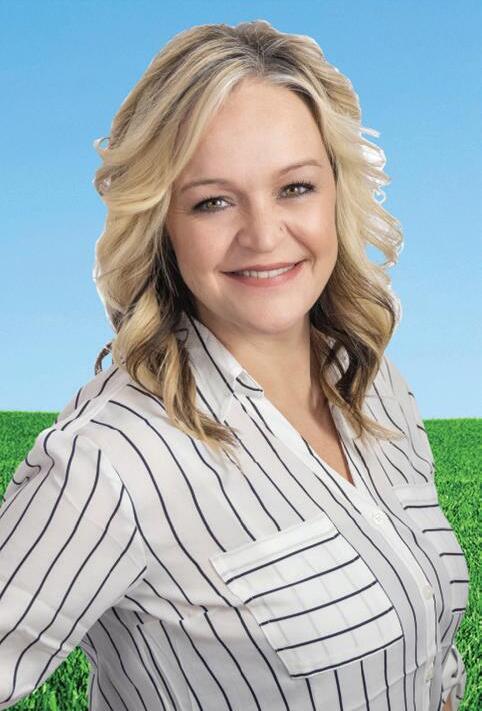




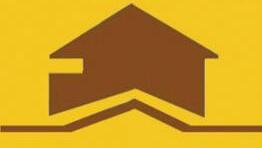

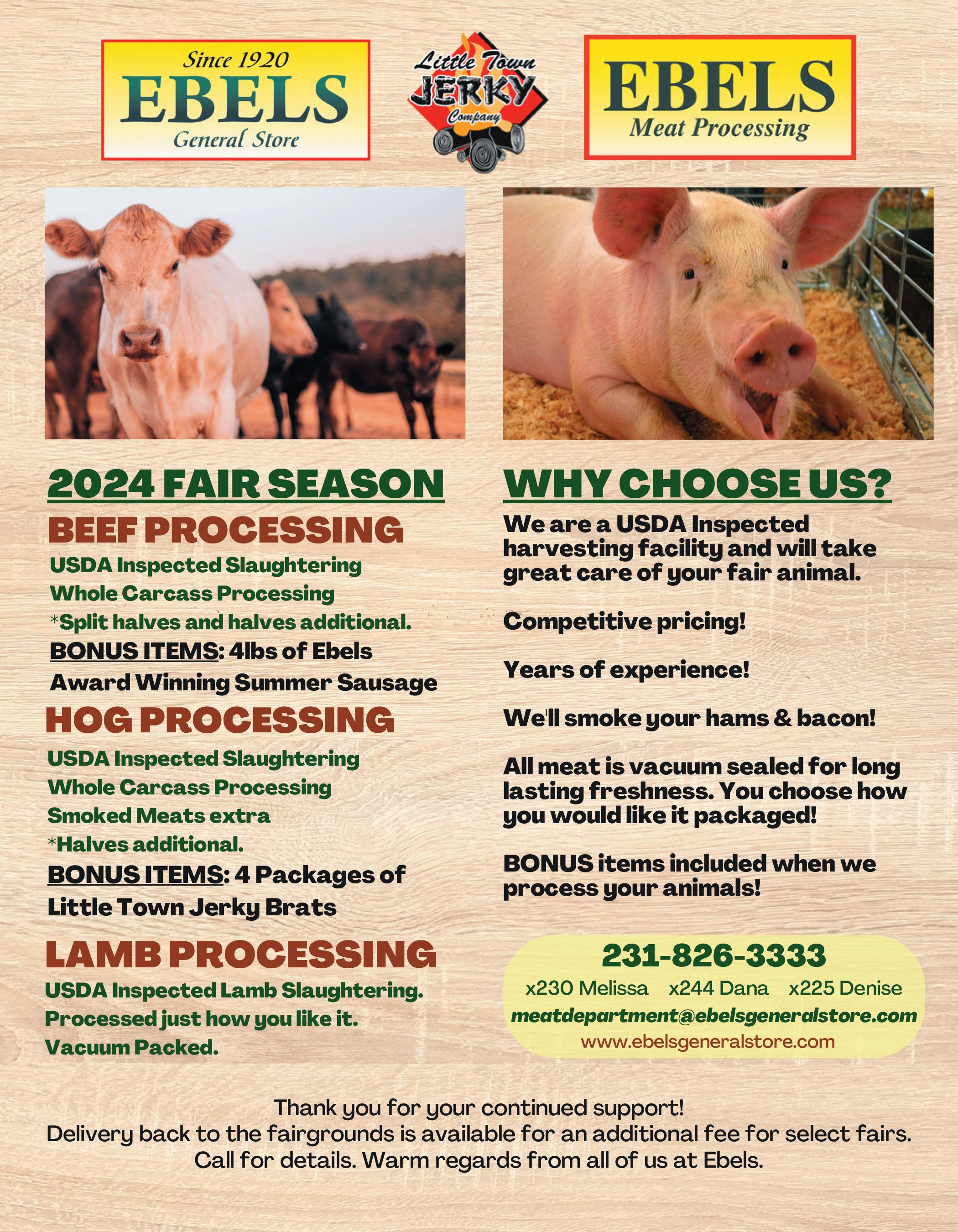
36. Project record books must be completed and submitted by 7:00 pm June 17th 2024 and have received an A or B premium for members to be eligible to sell. The club project leader of the species must also sign records.
37. Market animals cannot be shown in breed stock classes.
38. TB Policy for the current year - For Cattle and Goats All Cattle and goats must be identified with official identification before leaving the premises within the Modified Accredited Advanced Zone. Livestock Superintendents will check the animals to verify official identification and verify that the animals have met the testing requirements. Cattle, Goats, and Sheep that do not meet the guidelines will not unload and be sent home.
39. Youth members may sell only one finished steer: a dairy market beef or market beef at the Mecosta County Livestock Sale.
40. Each youth may sell up to four (4) market projects at the Mecosta County Livestock Auction (the above rules apply), one large project, three small projects, or four small projects. Large projects include dairy steers and beef steers. Small projects include swine, sheep, goats, dairy feeders, turkey, a pen of 3 chickens, a rabbit fryer, and a rabbit meat pen. Youth may enter one animal/pen per class except for sheep and goats. Exhibitors can sell two sheep or goats, which counts toward the four total projects. You may still bring one sheep or one goat if desired. If you bring two and they are in the same conformation class, another youth member of your choosing may help you show one animal. You may pick which market animal you want to show in showmanship. All swine are terminal and will be sold. Please contact the superintendent or the YEAC if you have any questions.
41. A member may register one (1) primary animal by the livestock registration deadline for their market livestock project. Family alternate (maximum of 1 per child) may also be tagged at that time. See project guidelines for specific rules that pertain to project animals.
42. All tagging deadlines will be enforced. No exceptions will be made for missed registration deadlines.
43. Animals must stay in designated areas and cannot be taken to the camping area.
44. Youth participants in the Mecosta county Livestock Auction will contribute 3% of their gross sale towards the educational events and activities necessary to maintain the livestock program.
45. All market animals weighed in at the fair but not going through the sale arena FOR ANY REASON must still pay for their photo and 3% commission of posted market weight. You must pay a minimum of $10 and a maximum of $100. This needs to be paid to the Mecosta County Fair Association within 30 days after the fair. If still outstanding by registration of the following fair deadline, you may not participate in that
year’s fair until the outstanding bill is paid.
46. Ear tags will be purchased at designated beginning weigh-ins.
47. PROJECT ANIMAL CERTIFICATION: All livestock shall not have received any substance not approved by the Federal Food and Drug Administration (FDA), the United States Department of Agriculture (USDA) for slaughter/breeding stock/exhibition animals. This includes but is not limited to diuretics, steroids, repartitioning agents, tranquilizers, and analgesics. Furthermore, concerning any drug, chemical, or feed additive approved by the FDA or USDA for slaughter animals, no illegal use of approved chemical/ compounds has taken place, and the applicable withdrawal period as recognized by the FDA has expired before shipping out of market livestock on any approved chemicals/compounds administered.
48. Livestock Testing Policy: The Mecosta County Fair Board has legal authority to require testing under the Animal Industry Act, Act 466 of 1988, as amended, in Section 40(3): “A fair, exhibition, or show authority may require additional testing or vaccination of animals before entry and during the fair, exhibition, exposition or show.”
• The Mecosta County Fair Board shall reserve the right to test any or all livestock entered in the Mecosta County Fair.
• The Mecosta County Fair Board shall have the right to eject and ban anyone committing an infraction of the rules.
• The expense for drug testing shall go to the person(s) owning the animal(s) if the test result shows proof of improper use of drugs. Improper use means medicines that have not been prescribed for the specific animal in question or medicines that have not been administered correctly according to amounts and times specified by a veterinarian.
• If a protest is lodged and testing is required, and the test results do not show proof of improper use, drug test’s expense shall go to the person(s) protesting.
• Testing Procedure: All animals may be subject to blood, urine, milk, and tissue tests, and the Mecosta County Fair Board reserves the right to disqualify any animals, either alive or slaughtered, found in violation of the use of drugs, chemicals, or feed additives as described above. Disqualification will result in the placing(s) of the animal in question being voided; the forfeiture of any ribbons/trophies/special awards earned with the animal(s); the assessment of a fine against the total premiums due equal to the amount to the premium(s) earned with the animal(s); voiding of the sale(s) if the animal(s) has been sold in the Livestock Sale and the disbarment of the exhibitor from exhibiting at the Mecosta County Agricultural Free Fair for a period of three (3)
years. Other animals will not be moved up in placing.
• A designated tester/veterinarian shall be allowed to draw any samples appropriate from the animal(s).
49. Livestock sample collection procedures:
• Performed by a Veterinarian/authorized representative Before the Fair
• Request the animal drug testing supplies from the Michigan Department of Agriculture, Laboratory Division at least thirty days before the event. See Contacts Sheet. Note: The fair has legal authority to require drug testing under the Animal Industry Ace, Act 466of 1988, as amended, in section 40(3);” A fair, exhibition, exposition, or show authority may require additional testing or vaccination of animals before entry and during the fair, exhibition, presentation or show.” at the fair.
• Verify the animal you are about to test by identifying any tattoos, ear tags, or ear notches on the animal. Whenever possible, use USDA official identification vs. farm identification. Be sure to include this information on the “Sample Tag.”
• Present the container for examination to the animal representative/exhibitor, verifying with the animal representative that the security seal has not been previously broken. If the sample container is rejected, use another container and return the defective one to the laboratory. Note: The animal representative must remain with the animal during the sample collection process.
• Record the seal # in the top right box of the Sample Transmittal Packing List.
• Open the container by pressing upward on the open tab, breaking the seal.
• Place the container in the catching stick; fold the lid back and anchor it under the metal finger welded onto the handle.
• If a urine sample can not be obtained, a Michigan Licensed Veterinarian/Veterinarian Technician may collect five tubes of blood from the animal. Each blood tube must be identified with one of the six small sticker tabs provided on the “Sample Tag.” Place the five labeled blood tubes inside a plastic sample container and seal as described below.
• After collecting the sample, close the lid and snap it completely shut. Loop the barbed plastic strip on the sample container through the two holes in the container tabs and pull tight. Apply a short piece of evidence tape across the protruding end to the plastic barbed strip, across
the lid, and down the sides of the container.
• Complete the information on the “Sample Tag,” substituting the name of the fair for “Track,” the name of the animal (Grand Champion Steer, etc.) for “Horse,” and the ear tag number or another; unique identification number for “Tattoo.” After the animal representative has watched the sample collection and sealing, they must sign under “Witness” on the “Sample Tag.” The person collecting the sample must sign under the “Sampled By” on the “Sample Tag.”
• Place one completed large sticker tag from the top of the “Sample Tag” on the top of the sample container over the evidence tape and the other completed large sticker tag on the side of the container. The remaining portion of the completed “Sample Tag” must be kept and NOT returned to the lab.
• Lock the sealed and labeled sample container in a metal can. Note: Once the can is locked, it cannot be opened until it reaches the lab.
• Samples must be kept secure and cold until transferred to the lab. Note: Urine may be frozen; blood must be kept refrigerated and never frozen.
• The veterinarians/vet technician should place any discarded needles in an approved “sharps” container by the veterinarians/ vet technician.
• When all sample collection has been completed, fill out the “Sample Transmittal Packing List.”
• The packing list must identify the tag number of all samples included in the case. Enclose the completed “Sample Transmittal Packing List,” any unused supplies and regenerated/refrozen packs in the case, and seal it with the provided intact case seal.
• After Sample Collection is Completed, transport samples to the lab either in person or by overnight express, arrange samples to arrive at the lab during regular business hours (7:30 am - 5 pm, Monday through Friday). The lab is located on the campus of Michigan State University at 1615 South Harrison Road, East Lansing, MI 48823.
• Collect and retain the remaining portion of the completed “Sample Tag.” Note: This document should be kept in a secure place for cross-reference when sample results are received. In a positive outcome, that document must be kept as evidence.
DAY TIME SHOW
Sat., July 6
Sun., July 7
Mon., July 8
8:00AM to 12:00PM Exhibit Building Check-In
1:00PM to 3:00PM Food Judging
3:00PM to 4:00PM Exhibit Building Bake Sale
6:00AM to 11:55AM Livestock Check-In
6:00AM to 11:00AM Pig Weigh In
11:00AM to 12:00PM Weigh in Beef Dairy Feeders Sheep Goats in order
4:00PM to 6:30PM Poultry Check In
6:30PM to 8:30PM Rabbit Weigh In
8:00AM to 10:30AM Rabbit Shows
11:00AM to 1:00PM Poultry Shows
1:00PM to 3:00PM Exhibit Building Judging
6:30PM to 8:15PM Grand Stand - Harness Racing
7:00PM to 8:00PM All Equine in place on Grounds
7:00PM to 8:00PM Equine Demonstrations
Tues., July 9
9:00AM to 2:00PM Swine Shows
2:00PM to 3:30PM Equine - Fitting and Showing (not cloverbud)
MIDWAY OPEN 3:30PM to 4:30PM Equine Versatility Team Competition Following previous 1PM to 11PM 6:00PM to 8:00PM Sheep Shows
Wed., July 10
6:30PM to 8:15PM Grand Stand - Harness & Celebrity Races
9:00AM to 12:00PM Cattle Shows - Market Beef followed by Dairy Market Steer, Dairy Market Feeders
MIDWAY OPEN 12:00PM to 1:00PM Baby Calf Show /will break other Cattle Classes for this class
12PM to 11PM 1:00PM to 6:00PM Equine 1/2 hour Cloverleaf,
2:00PM to 4:00PM Dairy
6:00PM to 7:00PM Goat
7:00PM to 10:00PM Bump
Thurs., July 11 9:00AM to 2:00PM Equine
4:00PM to 5:00PM Market
MIDWAY OPEN 5:00PM to 9:00PM Market 1PM to 11PM 7:00PM to 10:00PM Grand Fri., July 12 9:00AM to 4:00PM Equine 30 minute Poles, 30 minute
MIDWAY OPEN Equine 1PM to 11PM 7:00PM to 10:00PM Grand Sat., July 13 9:00AM to 11:00AM Equine Fitting
Lead Cloverbud
MIDWAY OPEN 11:00AM to 12:45PM Equine 1PM to 11PM 4:00PM to 5:30PM Showmanship 7:00PM to 10:00PM Grand 9:00PM to 10:00PM Horses Sun., July 14 6:00AM to 8:00AM Market

HAR N ES S R A C ING C ol t St a ke s
July 8 - 9 • 5:30pm $10/ person • $5/ 12 & under

Pedal Pull 1:00pm Fair Office South of the Grandstands Wednesday

Saturday, July 13th
Equine - Jumping, Huntseat, Saddle Seat Classes
hour break then Equine - Gymkana,
erleaf, Flags, Down and Back
Breed Stock Shows Start Shows
Bump & Run Off-Road Derby - Grand Stands
Equine - Trail & Reining Classes
et Sale Check In et Sale Begins
Grand Stand - Super Kicker Rodeo
Equine - Western Classes minute break followed by Equineoles, Stake Race, Speed & Action Keyhole minute break then
Equine - Costume Class Ages 8yrs-19
Grand Stand -Tractor Pull
Equine - Cloverbud Fitting & Showing, Pee Wee
Fitting Showing, Cloverbud Lead Line, Pee Wee Line, Walk Trot 7 yr. Cloverbud Trail, erbud Costume, Costume Classes
Equine Roping & Obstacle Course
Showmanship Sweepstakes
Grand Stand - Demo Derby
Horses & Non Market Departure
et Animals Departure




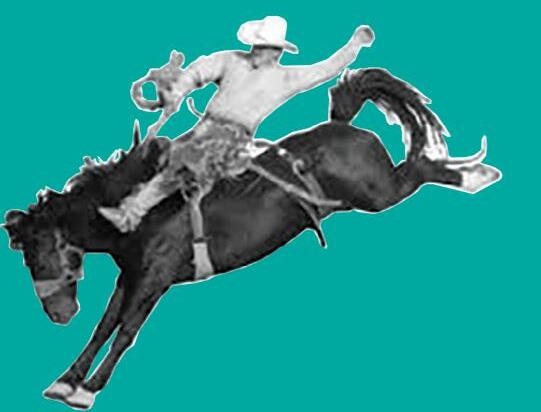







1. Judges will be appointed or hired by the Fair Board.
2. No person will be permitted to interfere with the Judge while performing their examination duty. The decision of the judge is final in all placing.
3. Premium awards will be designated as follows: ADULT AND YOUTH CLASS will be judged 1st, 2nd, and 3rd or under the Danish System, receiving A, B, and C ratings.
First Place Award - Blue Ribbon; Second Place Award - Red Ribbon; Third Place AwardWhite Ribbon. Showmanship Premiums: 1st $7, 2nd $6, 3rd $5 4th $4, 5th - 10th $3
Showmanship Class Descriptions:
• Cloverbud Showmanship (5-7)
• Beginner Showmanship (ages 6-8)
• Junior Showmanship (ages 9-12)
• Intermediate (ages 13-15)
• Senior Showmanship (ages 16 - 19)
Other Class Premiums :(Danish System). A $5, B $3, C $1
Premium checks will be mailed to the exhibitor. Premiums may be pro-rated.
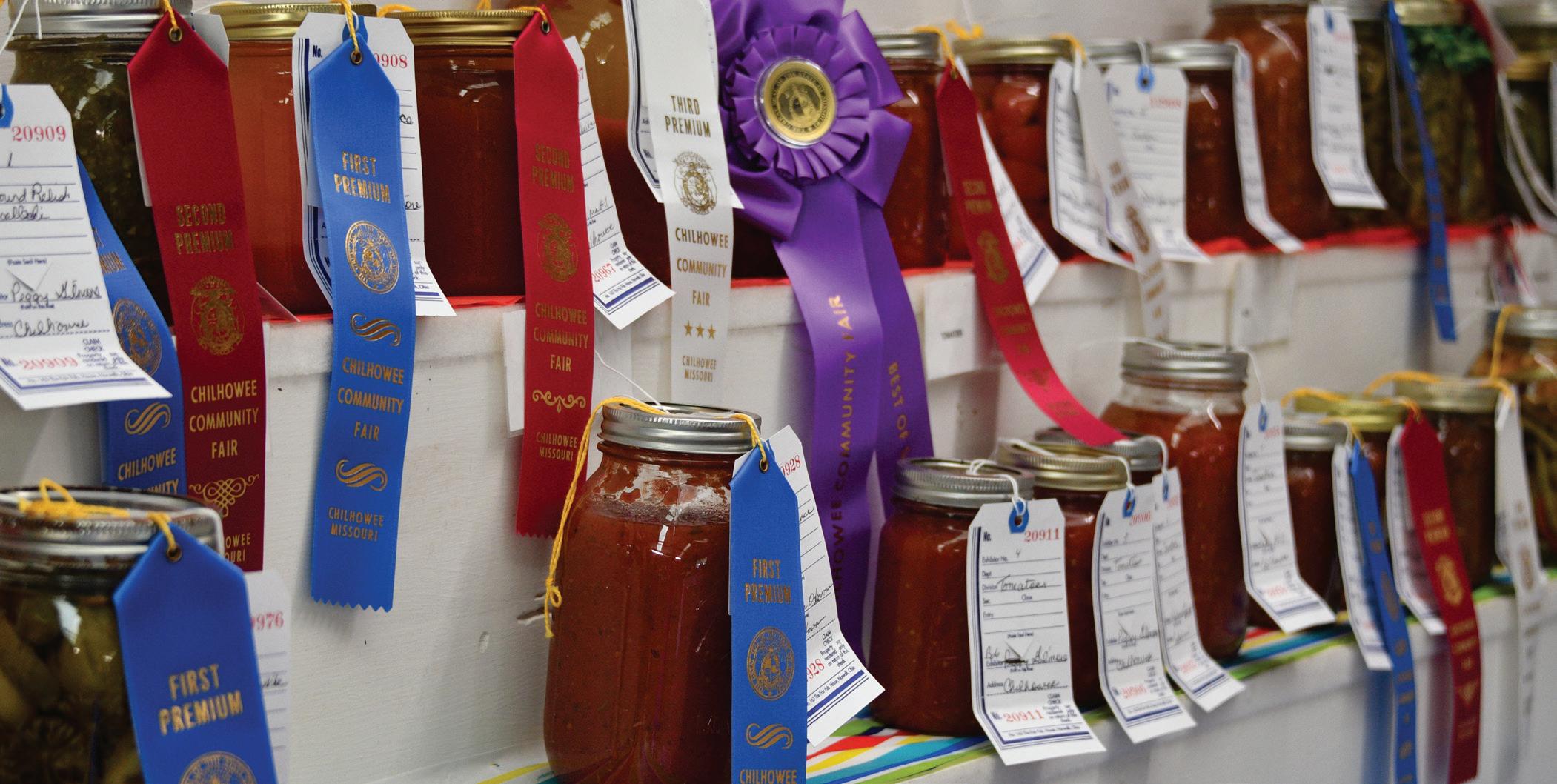
When satisfactory evidence has been obtained that a rule (s) or expectations (s) have been violated or fraud and deception have occurred in association with exhibiting in the fair, any following actions may be taken. Should fraud or deception be discovered PRIOR TO FINAL PLACING BY THE JUDGE, the exhibit will be declared ineligible to show. The exhibitor will be required to remove the exhibit(s) in question from the fairgrounds. Should the fraud or deception be discovered AFTER AN EXHIBIT(S) HAS BEEN JUDGED, the placing(s) will be voided, and the exhibitor is required to remove the exhibit(s) in question from the Fairgrounds. In case of fraud or deception discovered after MARKET LIVESTOCK has been judged and before the sale in the appropriate Market Livestock Sale, the placing(s) will be voided, AND the animal(s) in question not be permitted to sell in the sale. The exhibitor may be required to remove the market animal(s) in question from the Fairgrounds or be subject to isolation by the Michigan Department of Agriculture. If fraud or deception is discovered AFTER a MARKET ANIMAL (S) HAS BEEN SOLD, in the Market Livestock Sale, the monies associated as a reward (any funds above the market support price) shall be removed from the total sale price of the exhibit and retained by the sale sponsor as a penalty for the action. The money provided to the member will be that of the day’s going market value as determined by a joint decision of the involved superintendent and the Fair Board Livestock Committee.
Other animals will not be moved up in placing. Suppose any award(s) have already been awarded. In that case, the Fair Board Livestock Committee will require said exhibitor(s) to refund all premiums, trophies, awards, ribbons, and sale money under the assessed penalty.
Exhibitors, leaders, and parents compelled to bring a rules violation complaint against a given member(s) will be required to complete and sign a Rules Violation Complaint Form stating the reasons and alleged grounds for registering the complaint. All forms must be filed within 24 hours of the suspected violation.
Drug-related complaints require the complainant to deposit a sum equal to the amount needed for investigation, documentation, examinations, and tests as prescribed, not to exceed $250, but not less than $50. The
YEA Committee will then have the vet on call examine and test the animal and relate the test results to the Fair Management and the Department of Ag.
If the complaint is sustained, the deposit shall be returned to the complainant, and the defendant will be accessed the sum of money required. If the protest is not supported, the deposit shall be forfeited.
Any member(s) against whom a rules violation complaint has been filed will have the right to read the complaint form. The YEA Committee reserves the right to determine whether sufficient evidence exists to merit further action.
In the question of a rule(s) violation in association with exhibiting in the fair, the following due process will be used:
1. 1. The Livestock Superintendent, the YEA Committee, and the Extension Agent will question the exhibitor and parties involved regarding the alleged rule violation(s). Any party may submit statements and evidence.
2. 2. The vet on call will examine and, if they feel it is necessary, will do a blood, urine, or tissue test to determine if the animal in question has illegal drugs or has legal drugs in its system that exceed the accepted able levels established by the USDA, the FDA, the FARAD and EPA.
3. 3. If it is found that a rule(s) violation has occurred, the YEA Committee will decide the ruling. If, for reasons of further inequity, a decision regarding a rules violation claim cannot be rendered until some future time following the Fair, all parties involved will be notified by certified mail with a return receipt from the YEA Committee.
4. 4. All parties involved will have the right to present their cases as to why he/she/they feel the penalty (ies) should be reconsidered.
5. 5. All parties involved will be notified in writing within seven (7) business days after a final test result by certified mail with return receipt of the YEA Committee’s decision regarding the appeal.
Youth Livestock members, who intend to show any project at the Mecosta County Agricultural Free Fair, are required to fulfill a minimum of one educational requirement each year, 3 hours of community service, and attend one Junior Fair Board meeting (Before the Fair Meeting does not count). (Please check with the Program Coordinator or YEA Committee with any questions you have and activities that you are doing) Youth Livestock members must complete one of the following (as offered).
Guidelines for educational requirements are as follows:
a. Do a poster project to be entered at the fair about your specific species.
b. Attend a Mecosta County Livestock Educational Clinic.
c. Attend any livestock event/workshop sponsored by Michigan State University or Michigan State University Extension.
d. Complete/pass an Animal Science or Ag Science Class
e. Attend a breed stock or breed association event
f. County MSU Extension sponsored educational clinics and shows.
g. Participate in livestock or jackpot shows beyond the county level.
The livestock member is responsible for informing the Extension Office when they have completed and met their education requirement by turning in an Educational Tracking sheet to Extension Office signed by the member, their parent, and their livestock club leader. Educational tracking sheets are available online or from the Extension Office (see links on the front page).
Educational Requirements must be completed,
and tracking sheets submitted to the Mecosta County MSU Extension Office by 7 p.m. on June 17, 2024.
Members continuing to exhibit post graduation year must also complete two additional requirements as follows:
a. 2o hours of community service at the fairgrounds
b. Mentor a beginning youth exhibitor
c. Give an educational presentation (coordinate schedule and location with YAC)
d. Present an educational session at the spring clinic
e. Independent project (Approved and coordinated with the YAC)
Educational Posters done in place of educational requirements are due by 4:30 p.m. June 1st and will be viewed by a committee to determine they have met a quality standard. If the poster or book has not completed the appropriate quality standard, the youth will be notified and have one week to correct and return the sign. If the poster or text is not fixed, the poster will not count toward an educational requirement.
Failure to meet a livestock educational requirement will result in the youth member not showing or selling their livestock projects at the fair.
All educational and community service requirements must be met beyond attendance at regular club meetings. Every youth, ages 6-19, planning to show and sell livestock (any species covered in these guidelines) must attend at least one (1) Junior Fair Board Meeting per year to show and sell a livestock project (any species covered in this handbook) at the current year’s Mecosta County Fair. The pre or post-fair meeting does not count as an attended meeting. The only exceptions are custody and college travel of more than an hour.
1. Project members are to keep records for an entire year. Documents are turned in to their Project Leader.
2. Record books are due by July 1st.
3. Youth must participate in showmanship and turn in a record book to receive any money from the milk sponsorship.
4. No horns are allowed on breed stock cattle.
5. Exhibitor dress code: white shirt and white or black pants with boots.
6. All animals will be shown with a Dairy show halter and lead (no rope halters).
7. Provide proof of age of cattle shown: vaccination records, paper, or another legitimate document.
8. Brucellosis vaccination for cows after one year is recommended.
TB Requirements for all cattle projects:
Animal Identification
All cattle must be identified with official identification (RFID tags) before leaving premises within the Modified Accredited Advanced Zone.
a. All cattle must be appropriately identified with an electronic RFID tag.
1. The youth dairy feeder project is open to all members ages 6 to 19.
2. Members are required to complete a project record book.
3. Dairy feeders must be castrated and entirely healed by ending the weigh-in date. All animals must be free of all testicular tissue and properly healed before the exhibition.
4. Dairy feeders must have been selected, officially registered, and identified with an ear tag by the registration deadline.
5. Market feeder calves must be weighed in at the April weigh-in and weigh less than 350 pounds. The final weight must be between 350 and 949 pounds.
6. Non-market feeders may be brought and exhibited in the non-market feeder confirmation class. Youths must register for this class.
7. All animals must be dehorned before the entry date at the fair. Recommend at least six weeks be-
fore the fair to heal the animal adequately. If the animal is not properly healed, it will be sent home.
8. Members may register two animals; however, only one animal may be shown in market class and sold at the Market Sale.
9. Youth members ages 6 - 19 will exhibit animals for conformation judging and participate in showmanship classes.
10. Dairy feeders will be shown in the same manner as beef steers – with a show stick.
11. All animals must be appropriately identified with RFID electronic tags.
12. Animals raised and shown as a dairy feeder market project must be of dairy breeding, not dairy beef crossing.
13. All animals are required to have a halter and necktie on at all times
14. Youth with market and non-market animals must show their market animal in showmanship.



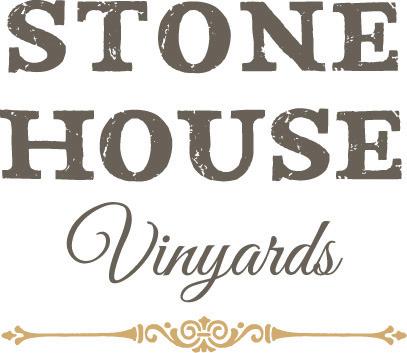


1. All steers must be weighed in and tagged at the December weigh-in before the Fair.
2. Youth members ages 8 -19 will exhibit animals for conformation judging and participate in showmanship classes.
3. Steers in this project area must be of a beef breed.
4. All animals must be dehorned before the entry date at the fair. At least six weeks before the fair, the animal is recommended to be adequately healed.
5. Youth members are limited to one finished steer project to be sold at the Mecosta County Livestock Auction.
6. The minimum finished weight is: 950 pounds.
7. Youth members in this project are required to complete a project record book.
8. To sell their beef project at the Livestock Sale, all market steer exhibitors must show in beef showmanship classes and the appropriate confirmation class.
9. All animals must be appropriately identified with an RFID electronic ear tag.
10. Cattle must be free and clear of all testicular tissue before being exhibited.
11. Heifers are designated and weighed in at the December weigh-in as market projects can be shown with the steers in market class.
12. Any steer or heifer shown in market class may not be shown in breed stock classes.
13. All beef steers must always have two ties when tied up.
14. Youth with market and non-market animal must show their market animal in showmanship.
Chicken, Duck, Turkey and Other Breed Stock, Chicken and Turkey Market Birds
1. All poultry (except waterfowl) exhibited must have documentation of pullorum typhoid testing.
2. Poultry will be judged using the American Standards of Perfection.
3. Poultry vaccinated for Infectious Laryngotracheitis (ILT) is not allowed at the fair.
4. Youth members must participate in appropriate poultry showmanship and fitting class to sell at the Mecosta County Livestock Auction. This means an exhibitor must participate in showmanship (in their division) of the same species as the market project. Market chicken project
exhibitors must provide or arrange a standard or Bantam chicken for showmanship with approval from the superintendent: market chickens may not be used for showmanship.
5. Exhibitors entering any goose for breed stock must compete in duck showmanship.
6. Breed and egg class exhibitors must participate in showmanship.
7. Youth members intending to sell a market poultry project at the Mecosta County Livestock Auction must complete the market pages for each project.
8. Market Poultry must receive an “A” or “B” premium during project judging to sell at the Mecosta County Livestock Auction.
9. Market Chicken Pen = 3 birds
10. Turkey pen = 1 bird
11. Duck pen = 1 bird
12. Youth members are responsible for selecting and obtaining their market birds. Members will not be required to order through the Extension Office.
13. Market Poultry must meet finished weight
requirements at weigh-in. Under weight poultry will be sent home. Weight ranges as follows:
a) Chickens: minimum weight of 5 pounds, maximum weight of 10 pounds each.
b) Turkey: minimum weight of 20 pounds, maximum weight of 40 pounds.
c) Duck: minimum weight of 7 pounds, maximum weight of 12 pounds.
1. Sheep are expected to be groomed according to their breed association standards and guidelines.
2. Exhibitors are expected to maintain and complete project record books.
3. Breed stock must do a project record book.
1. Minimum finished weight – 100 pounds.
2. Market lambs must be officially registered, tagged, and weighed in by the April date, as set by the Fair Board Livestock Committee.
3. All lambs must be clean, dry, and slick-sheared for the final weigh-in. Animals not meeting these requirements will not be weighed in or shown.
4. Market lambs will be ewes or wethers only.
5. Ewes shown in a market class may not be shown in a breed stock class.
6. All exhibitors must complete a project record book.
7. Lambs will be slick sheared to show. Wet Lambs will be disqualified. Any other tampering will also be disqualified. Exhibitors are expected to treat their lambs consistently with good animal husbandry and always display proper sportsmanship.
8. Four on the floor are expected after set up in the show ring.
9. Any liquid substance that alters the confirmation or enhances the natural appearance of the animal is not permitted. All lambs must be subject to random drug testing and veterinarian examination.
10. The direct application of ice, ice water, alcohol, Freon, or any other refrigerant to the hide of a lamb is strictly prohibited. The deceptive, fraudulent practice will cause the exhibitor and their animals to be disqualified immediately.
11. Exhibitors must participate in showmanship, and market lambs must be shown in the appropriate market conformation class to sell at the Mecosta County Livestock Auction.
12. All Lambs and goats shown must meet scrapie requirements. ALL TAGS AND TATTOOS MUST BE VISIBLE AT ALL TIMES.
a) All sheep moved within Michigan shall be identified with official USDA scrapie program identification tags before movement off the farm.
b) Do not remove tags before weigh-in or showing. It is illegal to remove official USDA individual animal identification.
13. Youth with a market and non-market animals
must show their market animal in showmanship.
1. Sheep must be kept on some form of bedding. No carpets allowed.
2. Lambs are shown with all four feet on the ground or ring surface.
3. Water must be available in pens and present at all times.
4. Humane handling practices of sheep at all times.
5. No electric clipping or shearing on fairgrounds for breed stock or market will be allowed except for minor leg and head trimming. All trimming must be done in an area designated by the sheep superintendent.
1. All hogs exhibited at the Mecosta County Area Fair will be sent to slaughter following the Mecosta County Livestock Auction. The Mecosta County Livestock Auction is a terminal sale for ALL swine. Pigs are sold for butchering purposes only. No hog can be taken home to a private/ commercial farm for breeding or other purposes. All hogs will go to slaughter on authorized trucks.
2. Ractopamine supplements are not to be part of any feed programs to participate. Could be subject to testing.
3. Minimum finished target weight for market hogs: 220 pounds.
4. Underweight market hogs below 220 pounds show and sell in roaster class. Swine below 190 will not be allowed to stay.
5. Maximum finished weight for market hogs: 320 pounds overweight hogs only get paid for 320 pounds.
6. Underweight and overweight market hogs can not compete for grand and reserve.
7. All market swine exhibitors must complete a project record book.
8. Market swine exhibitors must show in a swine showmanship class and the appropriate conformation class for their hog to sell at the Mecosta County Livestock Auction.
9. All hogs will be checked for hair length when they leave the scales. Once hogs have been weighed in, no further clipping is allowed during fair week. Clipping of market hogs after weigh-in is not permitted. Violation of this rule will result in the disqualification of the hog in both showmanship and market classes. Any hog that is found to have hair clipped shorter than ½ inch will be immediately disqualified from the fair and sent on a pre-designated truck to a livestock sale facility following weigh-in.
10. Market hogs must be registered and tagged with the Mecosta County Livestock tag, and State Mandated tag by the spring registration deadline set by the Fair Board Livestock Committee. A minimum of one (1) photo with both tags visible is required at registration time.
11. Stall signs must be kept in place in the swine barn until the animal has been placed on a truck to go to slaughter.
1. All market goats must be in the exhibitor’s possession by the spring weigh-in of the current program year.
2. Youth members must own all goats shown in the market goat classes.
3. Market goats must be selected, tagged, weighed in, and registered before the official deadline set by the YEA Committee.
4. A weight of 30 lbs or greater is recommended at the Spring weigh-in in April to ensure meeting minimum weight requirements at the fair weighin. Animals do not qualify if they have cut their yearling teeth by the spring registration date.
5. The minimum weight to sell a market goat project at the Mecosta County Livestock Auction is 50 lbs. A finished market goat project’s suggested weight is 80 to 90 lbs.
6. Any wether or doe shown in the market conformation class may not be shown in non-market classes.
7. Wethers or does shown as a market goat must be a standard/recognized meat goat breed or at 50% of a standard/ recognized meat goat breed.
8. Wethers/does will not be de-wormed any later than 30 days before the fair, and exhibitors are not allowed to feed weight-producing chemicals to their projects.
9. All exhibitors in the market goat class must complete a market goat project record book.
10. Exhibitors must participate in appropriate market goat showmanship classes and conformation classes, and complete and turn in a proper record book to be eligible to sell their market goat project at the Mecosta County Livestock Auction.
11. Disbudding of a Market Goat is not required. Males must be castrated and free of all testicle tissue and healed at check-in. If disbudding did take place, it must be healed at the time of check-in.
12. Market Goat exhibitors are expected to wear a clean western or collared shirt tucked in with a belt, clean jeans, and appropriate footwear.
13. Market goats must be body shaved/clipped before fair check-in. Three to seven days prior is preferred.
14. All goats shown on the Mecosta County fairgrounds must meet scrapie requirements.
15. Animals must be checked-in by the species superintendent before being placed in a stall. All goats must have visible scrapie identification, be free from lumps, disease, and parasites, castrated (healed), and have no wounds or sores.
1. Non-market goat exhibitors are expected to wear western wear and appropriate footwear.
2. Any whether or doe shown in the market confirmation classes may not be shown in nonmarket classes.
3. Exhibitors are expected to groom animals according to their breed standards.
4. Animals must be checked-in by the species superintendent before being placed in a stall. All goats must have visible scrapie identification, free from lumps, disease, parasites, castrated (healed), and no wounds or sores.
5. All goats shown on the Mecosta County Fairgrounds must meet scrapie requirements.
All goats shown on the Mecosta County Fairgrounds must meet scrapie requirements. All tags and tattoos must always be visible. Paperwork for verifying tattoos must be present and available.
a) All goats moved within Michigan shall be identified with official USDA scrapie program identification tags/tattoos before movement off the farm.
b) Do not remove tags or tattoos before weighin or showing. It is illegal to remove official USDA individual animal identification.
1. Rabbits/Cavy and record books must be checked in by the approved deadline Sunday of fair week.
2. A left ear tattoo is required for all rabbits. A left ear ID tag is necessary for all cavy: no tattoo/ID tag, no exhibit.
3. A rabbit/cavy pedigree is to be presented for examination if requested.
4. Each exhibitor is responsible for feeding, watering & cleaning used pens daily.
5. Exhibitors will be limited to a total of 8 rabbits.
6. Exhibits may be shown in any class desired but can only be shown once.
7. There will be no breeding on fairgrounds.
9. Exhibitors must participate in Rabbit/Cavy Showmanship to show a rabbit/cavy in a breed or market class.
10. The superintendent must be informed of the number of cages needed by July1st.
11. All participants are expected to assist with the setup and cleaning of the Rabbit/Poultry Barn and the cleanup following the fair – dates are announced annually by the Superintendents.

12. Superintendents are to check in all rabbits/ cavy. All animals are to be healthy and disease-free. Any animal showing signs of illness will be sent home, and no replacement will be allowed.
The youth member’s responsibility is to get with the buyer to determine when rabbits are to be butchered. All butchering and processing are the responsibility of the members – NOT THE BUYER and should be done in a timely fashion.
Thank you, letters should be sent within two weeks of the fair.
“B” ratings will be given if:
a) pictures are not in by the deadline
b) rabbits are over 5 ½ lbs. (ARBA minimum will not be followed)
c) so deemed by the judging on the show day
To sell at the Mecosta County Livestock Auction, the exhibitor must:
a) Receive an “A” or “B” rating
b) Be present to sell.”
c) Meet Fair Board Livestock Committee






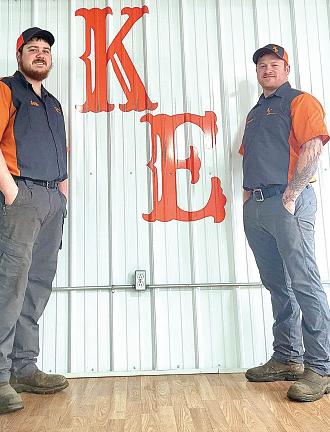



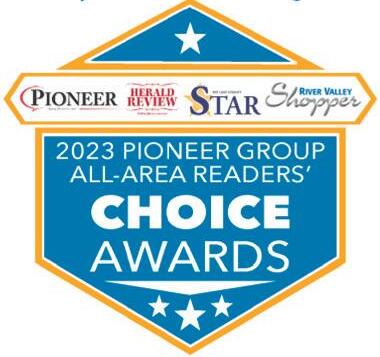

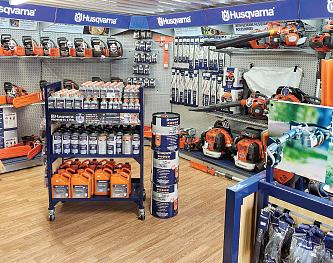











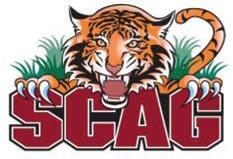
Educational and Volunteer Requirements.
1. Meat rabbits must be registered in the Extension Office by the deadline set by Rabbit Superintendent with a picture at 2 weeks old. Images at six weeks old will be submitted to the Extension office two weeks before the fair deadline. Both 2and 6-week views are to include the exhibitor and litter.
2. A meat pen consists of 3 rabbits of the same breed and variety. Rabbits must weigh a minimum, of 3 lbs. may not weigh over 5 ½ lbs. and cannot be over 70 days (10 weeks) old. Mixed breeds are allowed but may be penalized at the judge’s discretion. Record books must be kept on all litters and are due by 8:00 p.m. on the beginning Sunday of fair week.
3. You may show and sell both one Fryer project and one Meat Pen project. The market pen will be sold by the combined weight of all three (3) rabbits, not the average weight.
1. Youth members may show no more than two horses.
2. Horse changes will be considered for the following circumstances ONLY. The Horse Leaders Committee will review and make decisions regarding exceptions.
a) Death of a project animal.
b) Lameness of project animal.
c) Project animal is considered unsafe.
3. A negative Coggins test is required by May 1 for all registered horses and must be valid through August 31 of the current calendar year. A photocopy must be attached to the Horse Registration papers.
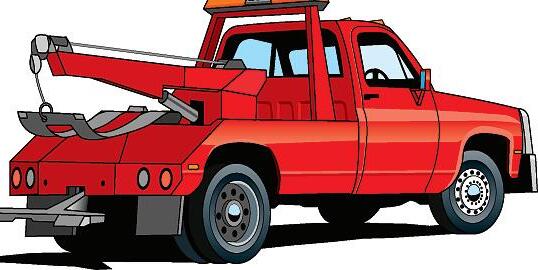

4. Members must be at least five years of age on January 1 to bring a project horse to the fair.
5. To participate and stall at the fair, members must show at one qualifying show, and record books must be completed by June 1 to show at the fair.
6. During lead-line classes, the rider must be led by an adult (18 years or older) and have a lead line attached to a halter, which has been placed under the bridle. This class is appropriate for all Cloverbuds 5-7 years old. No spurs will be allowed in this class.
7. Walk-Trot 7-year-old riders must have an adult (18 years or older) in the ring to act as a spotter. This person does not have to hang on to the halter but must be nearby in an emergency. Halters must

be worn under the bridle, and bump spurs only will be allowed if necessary.
8. Youth members aged (5-7) must wear SEIASTM-approved helmets for all horse experiences. Bike helmets do not qualify. All youth must have their feet in stirrups while on their horse.
9. Rules, announcements, vet lists with phone numbers, and safety information will be posted at each barn and must be followed.
10. The arenas may be used for practice only under the supervision of an adult or leader.
11. Only youth Horse & Pony project members, leaders, and immediate family may ride a youth member’s registered horse on the fairgrounds during Mecosta County Fair activities.
12. Appropriate boots and long pants must be worn in the arena (absolutely no tennis shoes or sandals). It is also advised that club leaders and parents be responsible for seeing that appropriate shirts are worn for practice. Short-sleeved Western shirts will be acceptable in Gymkhana classes (no t-shirts, tank tops, or sleeveless shirts). No sunglasses will be allowed in the show arena. Prescription transition lenses are accepted.
13. On show days, horses and ponies may be mounted and walked safely between the barn and arena. At all other times, horses and ponies shall be led to and from the arena and mounted inside the arena.
14. Wash racks may be used with consideration being given to other species being prepared for classes. Horses should not be left unattended at the wash racks.
15. Bareback riding is acceptable inside the arena only, wearing an SEI-ASTM-approved helmet is required.
16. Horses and ponies must be bridled when ridden, and halters must be accessible when stalled.
17. No stopping on the rail in the arena; mounting and dismounting in the center of the arena only.
18. Halter or lunging practice in the arena is ,only allowed in the center of the arena.
19. All horses in the arena should be worked in the same direction at all times-pleasure gates only.
20. One rider on the horse at all times.
21. No riding in the barns.
22. There is no riding near the midway rides, camping area, livestock area, or stands. Riding will only be done in designated areas.
23. Pleasure gates only during all exercise practice times. Practice times for jumps and speed practice will be at pleasure gaits.
24. Project animals considered a risk to the public or other exhibitors would not be allowed to exhibit. The Fair Board Livestock Committee and Horse Superintendents will make determination.
25. No youth will be allowed with bare feet or open toes shoes while handling a horse at any Mecosta County Fair function.
26. Any misconduct with or improper care of a horse/pony or youth may result in being asked to leave the fairgrounds with loss of premium.
27. Unthrifty animals with low body scores, determined to have lice, health issues, or unsoundness, may not be allowed to exhibit and may be asked to leave the show grounds.
28. Only one stall per member will be allowed at the fair. Any exceptions to this must be cleared through the Horse Superintendents and Horse Leaders Committee. Barns close at 11:00 pm during fair week.
29. Stalls must be cleaned before leaving the grounds. A $20 stall deposit may be charged at the two qualifying shows and refunded when stalls are cleaned and inspected by a Leader.
30. Camping sites are available at point shows for an additional fee.
31. All participants in all Hunter, Dressage, Bare-
back, Saddle seat, all novice classes, and gymkhana (speed) classes must wear properly secured protective riding helmets that bear the ASTM-SEI Certification label while mounted. Bike helmets do not qualify.
32. Exhibitors may show in the novice division for no more than two years unless approved by Horse Leaders Committee. Novice Walk/Trot is available for all novice riders who are uncomfortable with the canter. Novice riders may only ride in Novice division classes. Novice Fitting & showing does not count as years of riding. The novice division is intended for beginning riders, not green horses. The Horse Leaders committee will address unique concerns and considerations.
33. Exhibitors must show in the same division all year unless approved by the leader’s committee. Novice Walk/Trot may be moved up in the Novice division with the approval of the leader’s committee but will not then be eligible to go back to Novice Walk/Trot. Novice exhibitors may participate in Gymkhana events in the appropriate division at the discretion of their leader. Novice Walk/Trot riders must trot if riding in Gymkhana classes. Ponies may be ridden in the pony division or age division but not in both. Ponies cannot be taller than 56 inches, with ½” allowed for shoes. The Horse Show Committee must measure all ponies before the first show, the date, and the location set by the committee. Ponies that have been previ-
ously measured and are under 50 inches or over 12 years of age do not have to be measured again. Horse Leaders will address unique concerns and considerations.
34. Divisions: 16-19 13-15 8-12 Pony 8-19 Novice 8-19 Cloverbud 5-7 Pee-Wee <5 ROC Novice ROC Intermediate ROC Advanced.
35. In gymkhana, the rider has to ride into the arena. The rider must dismount in the ring. THE HORSE MUST BE UNDER CONTROL.
36. Patterns cannot be changed once a class has started. A re-ride will be granted at the judges’ discretion.
37. Grand and Reserve Champions for Gymkhana at the fair will be determined in each event. They will be determined by taking the top two speeds from each division, and then the top two from those eight will be the Grand and Reserve.
38. Any disputes must go through club leaders.
39. Anyone showing unsportsmanlike conduct can be asked to leave the show grounds and will lose all show points accumulated during the show.
40.Horses cannot be brought to the arena for intentional rolling.
41. No rider can ride in the same class twice.
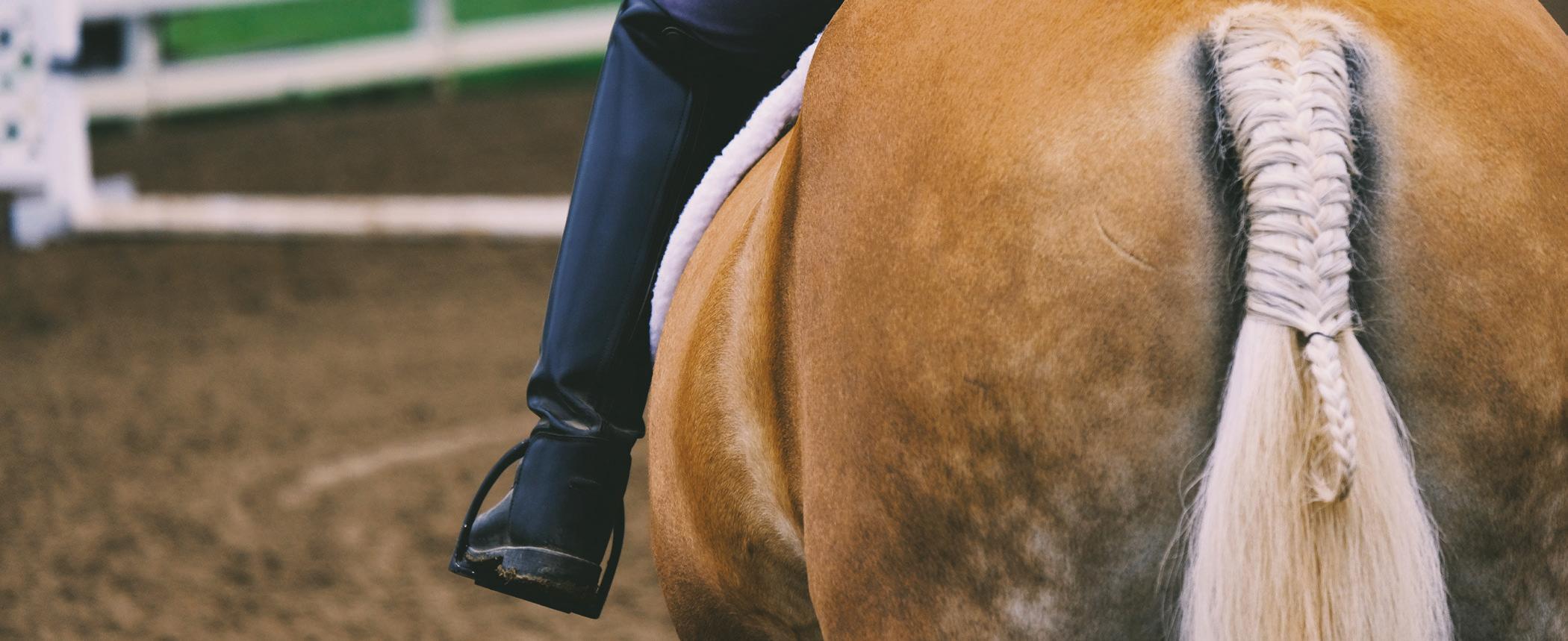


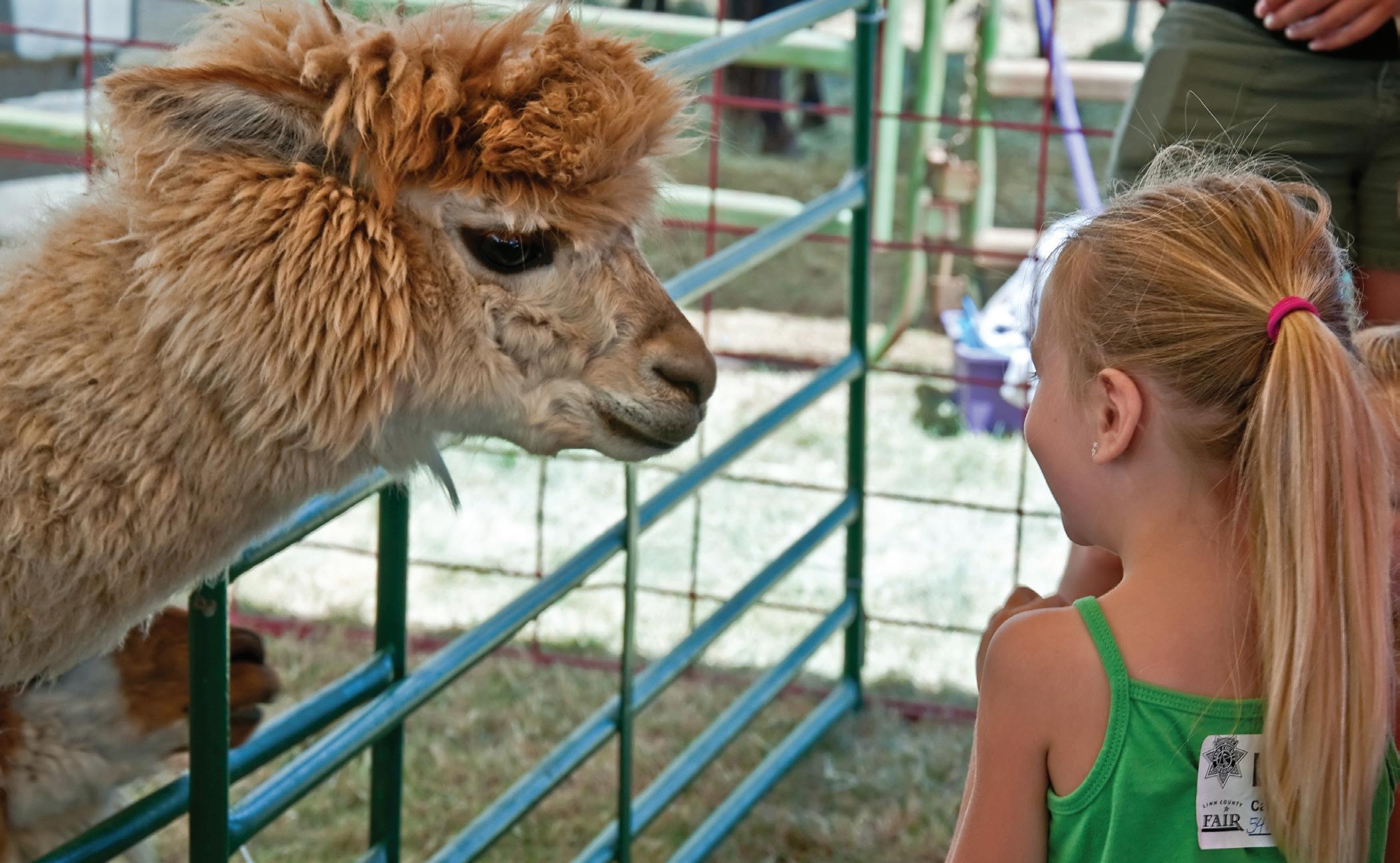

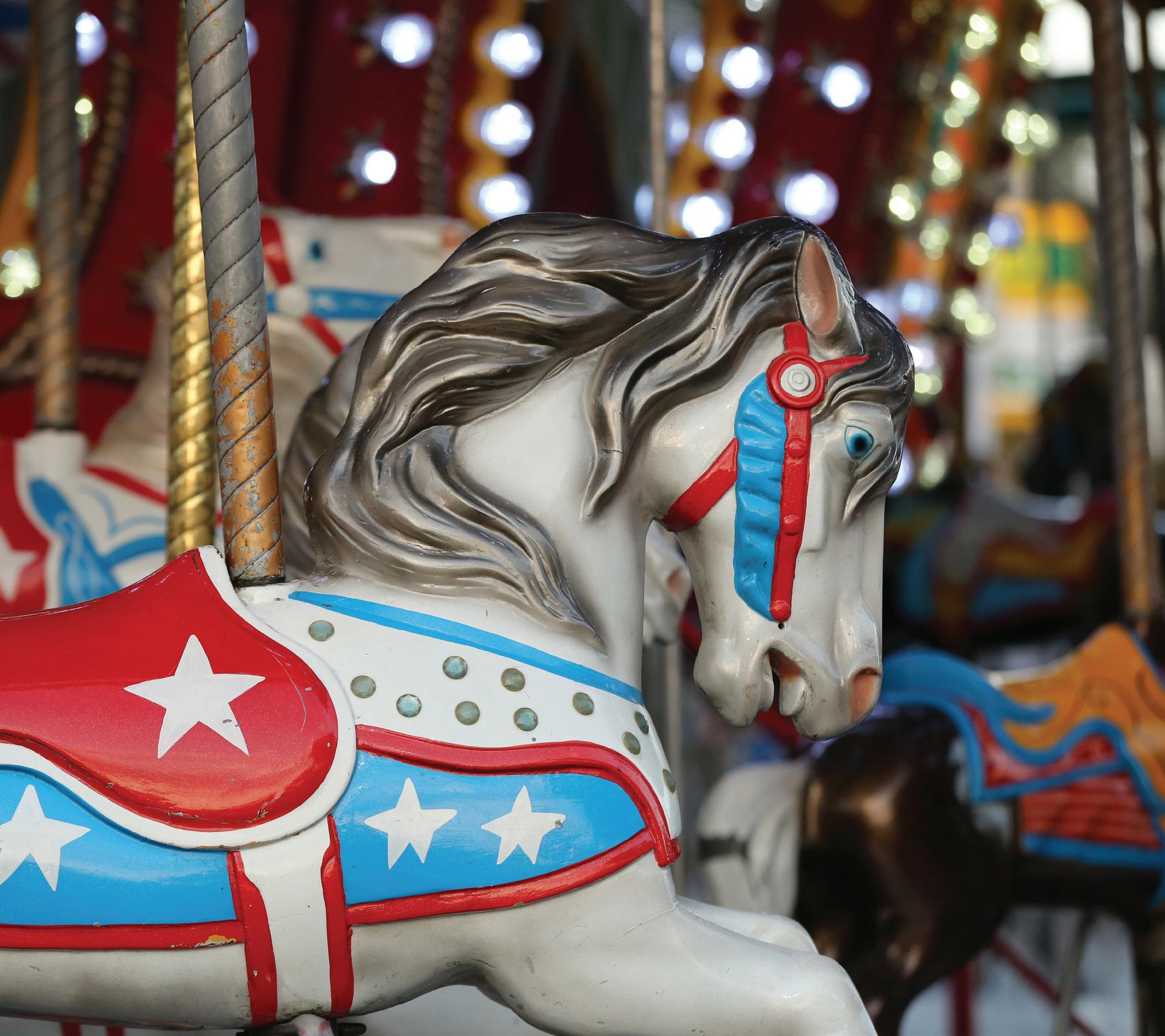

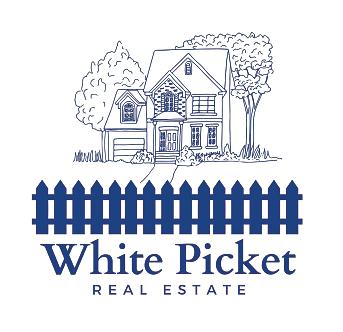



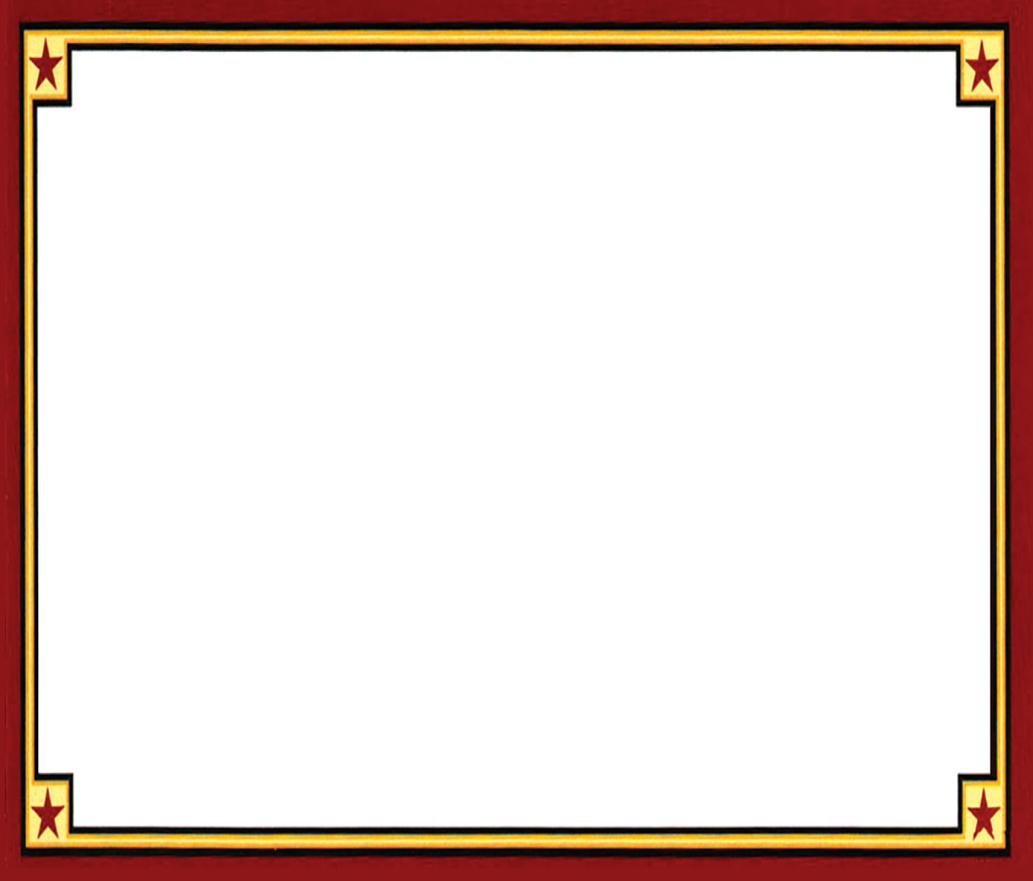

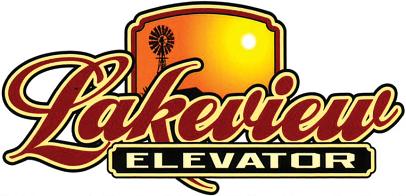

1. The top two (2) showmanship winners from each species are eligible to compete.
2. Participants show an animal project from each showmanship species: Ducks, Dairy Breed stock, Dairy Market, Dairy Feeders, Beef, Sheep, Swine, Chicken, Horses, Rabbits, Cavy, Turkeys, and Goats.
3. Where a champion has won with multiple species, the honorable mention will be invited to participate from each species that the champion won with. If the honorable mention declines, that spot will not be filled.
4. Superintendents will take a headcount of livestock on Sunday after check-ins. If there will not be at least six available livestock per species, then the committee will attempt to have more livestock brought in for the show.
5. All qualifying exhibitors must show each species. No “bye” allowed.
6. Animals and exhibitors will be numbered before the start of the competition. Exhibitors will show the animal with the same number unless it is their animal or an animal that belongs to their family member.
7. Score sheets will be collected between each group change. Groups will have 7 minutes with a short walk time in between species.
8. Participants’ parents cannot communicate with judges before or during the competition. If a parent is a superintendent, the conversation must be limited to that necessary for the event.
9. A person is no longer eligible for Showmanship Sweepstakes after winning Grand Champion Sweepstakes Showman.
10. The Grand Champion Sweepstakes Showman will receive a Carhartt jacket/or jacket of their choice. Winner must purchase a coat of their choice and turn in the receipt to Mecosta County Fair Board for reimbursement. They must also turn in their jacket to the Fair Board Live Stock Committee so they can send it out for the embroidery work to be completed. The maximum amount allowed for coat and embroidery is $200.
11. The Reserve Champion Showmanship Sweepstakes winner will receive an embroidered sweatshirt.
12. The trophies received for winning sweepstakes are rotating trophies and must be returned to the MSU Extension Office by First Friday in June of the following year.
Superintendent: John Ball & Darla Zimmerman
Beginner Showmanship (ages 6-8)
Junior Showmanship (ages 9-12)
Intermediate Showmanship (ages 13-15)
Senior Showmanship (ages 16 - 19)
Section B- Dairy Breed Stock Conformation (All Breeds)
• Junior Heifer Calf, born after March 1, 2024, and over four months of age at showtime
• Intermediate Heifer Calf, born after December 1, 2023, and Before February 28, 2024
• Senior Heifer Calf, born after September 1, 2023, and before November 30, 2023
• Summer Yearling Heifer Calf, born after June 1, 2023, and Before August 31, 2023
• Junior Yearling Heifer, born after March 1, 2023, and before May 31, 2023
• Senior Yearling Heifer, born after September 1, 2022, and before February 28, 2023
• Two-Year-Old Milking Cow, born before September 1, 2022
• Three Year Old Milking Cow, born before September 1, 2021
• Aged Cow over three years old
• Dry Cow (Must have completed one lactation)
Section C- Dairy Record Books
Dairy Breadstick Record Book
DEPARTMENT 2 Beef
Superintendent - John Ball & Darla Zimmerman
Section A- Dairy Market Beef Showmanship
Junior Showmanship (ages 8-12)
Intermediate Showmanship (ages 13-15)
Senior Showmanship (ages 16 - 19)
Section B- Market Beef Showmanship
Junior Showmanship (ages 8-12)
Intermediate (ages 13-15)
Senior Showmanship (ages 16 - 19)
Section C - Market Feeder Showmanship
Beginner Showmanship (ages 6-8)
Junior Showmanship (ages 9-12)
Intermediate (ages 13-15)
Senior Showmanship (ages 16 - 19)
Section D - Conformation
Market Dairy Beef Conformation
Market Beef Conformation
Market Feeder Conformation
Non-Market Feeder Conformation
Section E - Beef Cattle Breed Stock
Beef Heifer
Beef Cow/Calf Pair
Section F - Record Book
Market Beef Record Book
Market Dairy Beef Record Book
Market Feeder Record Book
DEPARTMENT 3- Swine
Superintendent: Lauren Marfio & Stacey Hough
Section A - Swine Showmanship
Beginner Showmanship (ages 6-8)
Junior Showmanship (ages 9-12)
Intermediate (ages 13-15)
Senior Showmanship (ages 16 - 19)
Section B - Conformation
Market Swine Conformation
Section C - Record Book
Market Swine Record Book
4- Sheep
Superintendent: Faith Kwiatkowski
Section A - Sheep Showmanship
Beginner Showmanship (ages 6-8)
Junior Showmanship (ages 9-12)
Intermediate (ages 13-15)
Senior Showmanship (ages 16 - 19)
Section B - Market Sheep Confirmation
Market Sheep Conformation
Section C- Breed Stock
Ewe Lamb - under one year
Ewe Yearling - over one year, under two years
Ewe - 2 years and over
Ram Lamb - 8 months or under
Section D - Record Book
Market Sheep Record Book
DEPARTMENT 5- Goat
Superintendent: Faith Kwiatkowski
Section A - Market Showmanship
Beginner Showmanship (ages 6-8)
Junior Showmanship (ages 9-12)
Intermediate (ages 13-15)
Senior Showmanship (ages 16 - 19)
Section B - Non-Market Showmanship
Beginner Showmanship (ages 6-8)
Junior Showmanship (ages 9-12)
Intermediate (ages 13-15)
Senior Showmanship (ages 16 - 19)
Section C - Market Conformation
Market Goat Conformation
Section D - at Breed Stock Classes
Best of Show (All Breeds)
Section E - Record Books
Market Goat Record Book
6- Poultry
Superintendent: Mary Jo VanOstenburg
Section A- Chicken Showmanship
Beginner Showmanship (ages 6-8)
Junior Showmanship (ages 9-12)
Intermediate (ages 13-15)
Senior Showmanship (ages 16 - 19)
Section B- Turkey Showmanship
Beginner Showmanship (ages 6-8)
Junior Showmanship (ages 9-12)
Intermediate (ages 13-15)
Senior Showmanship (ages 16 - 19)
Section C- Duck Showmanship
Beginner Showmanship (ages 6-8)
Junior Showmanship (ages 9-12)
Intermediate (ages 13-15)
Senior Showmanship (ages 16 - 19)
Section D- Market Project
Market Chicken Project
Market Turkey Project
Market Duck Project
Section E- Poultry Breed Classes
Standard - Laying Breeds
Standard - Dual Purpose/Meat Breeds
Standard - Ornamental/Rare & Fancy
Bantam - Clean Legged Section
Bantam - Feathered Legged
Cock, one year and older
Hen, one year and older
Cockerel, Under one year
Pullet, Under one year
Breeding Pair - 1 male, one female, same breed
Trio - 1 male, two females, same breed
Mother Hen and Chicks (pen) Section J - Waterfowl
Duck - Female
Drake – Male
Breeding Pair of Ducks - 1 male, one female, same breed
Mother Duck and Babies
Gander - Male
Goose - Female
Breeding Pair of Geese - 1 male, one female, same breed
Mother Goose and Babies
Tom - Male Turkey
Hen - Female Turkey
Section F - Record Book
Market Chicken Record Book
Market Turkey Record Book
Market Duck Record Book
Section G – Eggs
One Dozen Eggs
One Decorated Egg (Egg must be blown out)
DEPARTMENT 7- Rabbits
Superintendent- Julie Strohkirch
Section A - Rabbit Showmanship
Beginner Showmanship (ages 6-8)
Junior Showmanship (ages 9-12)
Intermediate (ages 13-15)
Senior Showmanship (ages 16 - 19)
Section B - Market Project
Market Pen of Rabbits
Market Fryer Rabbit
Section C- Non-Market Conformation
Dutch Champagne
Polish Silver Fox
Lion Head Flemish Giant
Holland Lop New Zealand
Mini Lop Californian
Mini Rex Mixed Breed
Netherland Dwarf All Other Pure Breeds
Himalayan
Section D- Record Book
Market Rabbit Record Book
Section E- Peewee & Cloverbud
Peewee/Cloverbud Showmanship (ages 4-5)
DEPARTMENT 8- Cavy
Superintendent- Julie Strohkirch
Section A- Showmanship
Beginner Showmanship (ages 6-8)
Junior Showmanship (ages 9-12)
Intermediate (ages 13-15)
Senior Showmanship (ages 16 - 19)
Section B- Cavy Breed Class
American Longhaired
Teddy Other Texel
Section C- Record Book
Cavy Record Book
DEPARTMENT 9- Horses
Superintendent: Tiffany Spedowski
Reference Separate Show Bill outside the fair book.
Section A- Fitting and Showmanship
Novice 13 to 15
Pony 16 and over 8 to 12
Section B- Hunt Seat Equitation
Novice 13 to 15
Pony 16 and over 8 to 12
Section C- Saddle Seat Equitation
All Ages
Section D- Western Horsemanship
Novice 13 to 15
Pony 16 and over 8 to 12
Section E- Record Book
Horse and Pony Record Book
Section F- Horse Demonstrations
Horse Demonstrations- Individual
Horse Demonstration- Team
Section G- Roping and Obstacle Course
Ground Stationary Roping
Obstacle Course
Goat Tying
Section H- Peewee & Cloverbud
Peewee <5
Cloverbud 5-7
Youth will demonstrate their ability to keep barn areas clean for the health and welfare of the animal exhibits.
Rules and Information:
1. One entry per club, per species area. The club leader should make entries.
2. To stimulate interest in good herdsmanship and livestock care, special awards will go to the clubs keeping their animal exhibits in the cleanest, healthiest, and most attractive condition throughout the fair duration. All animals will be examined daily, and each club’s animal exhibits will be judged daily.
3. Clubs are encouraged to have youth members “on duty” in the barns during regular barn hours to keep
club areas clean and to be on hand to answer questions.
4. Awards will go to the top 3 clubs in each species area only.
5. The following will be considered and examined during the daily inspection:
a. Comfort and condition of the animals - including cleanness.
b. Proper feed and water equipment.
c. The exhibit area is well-defined and maintained in a tidy state.
Cattle Herdsmanship
Horse Herdsmanship
Swine Herdsmanship
Rabbit Herdsmanship
Sheep Herdsmanship
Cavy Herdsmanship
Goat Herdsmanship
Poultry Herdsmanship





